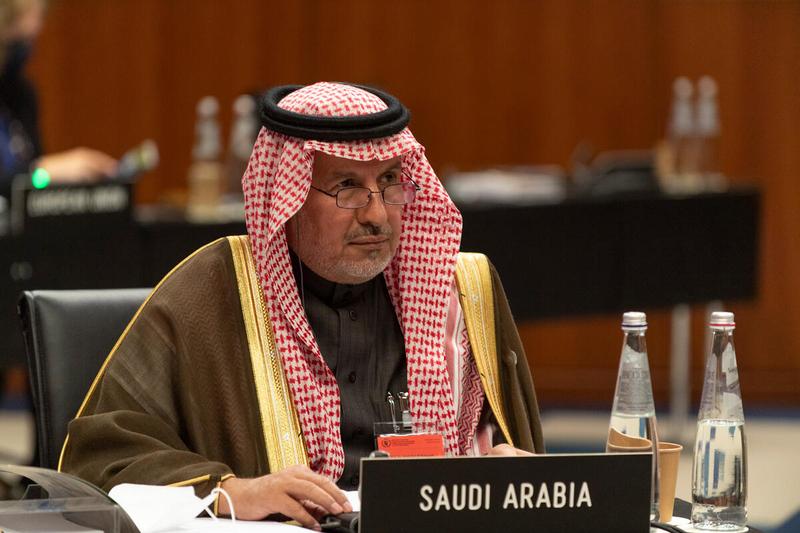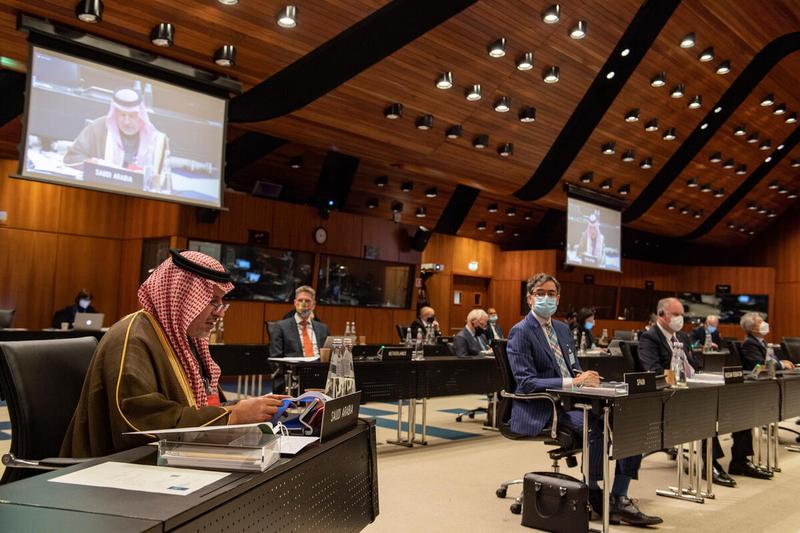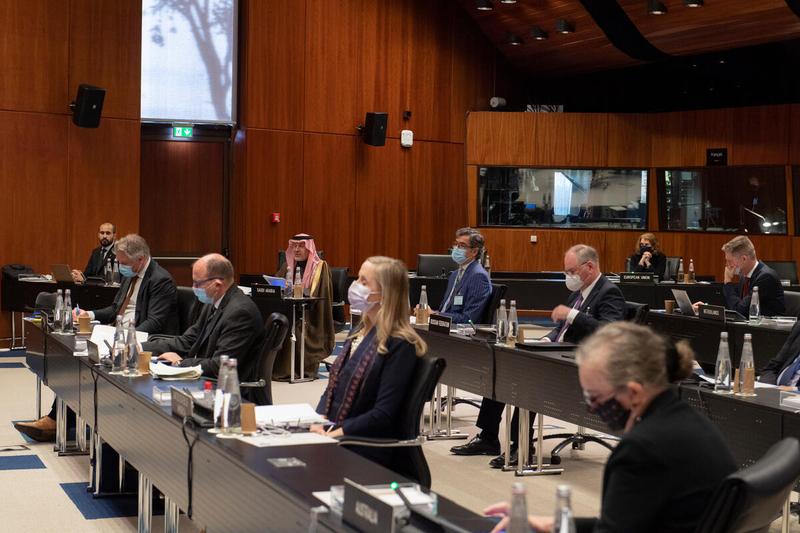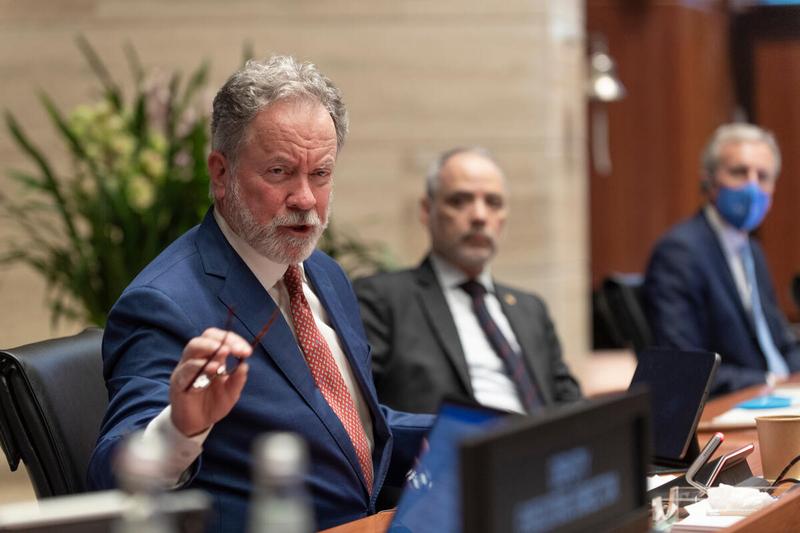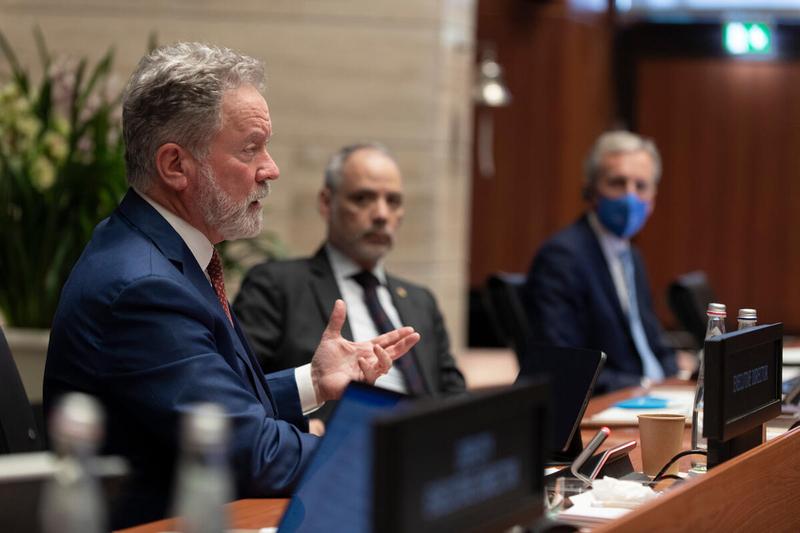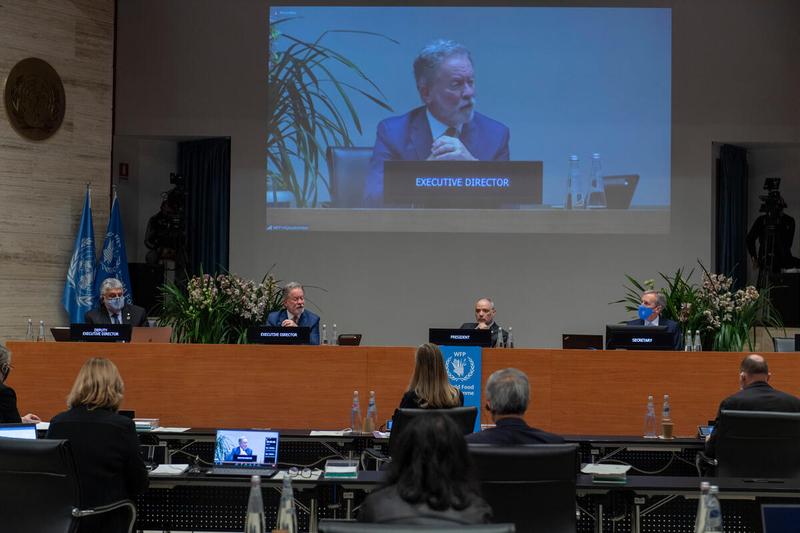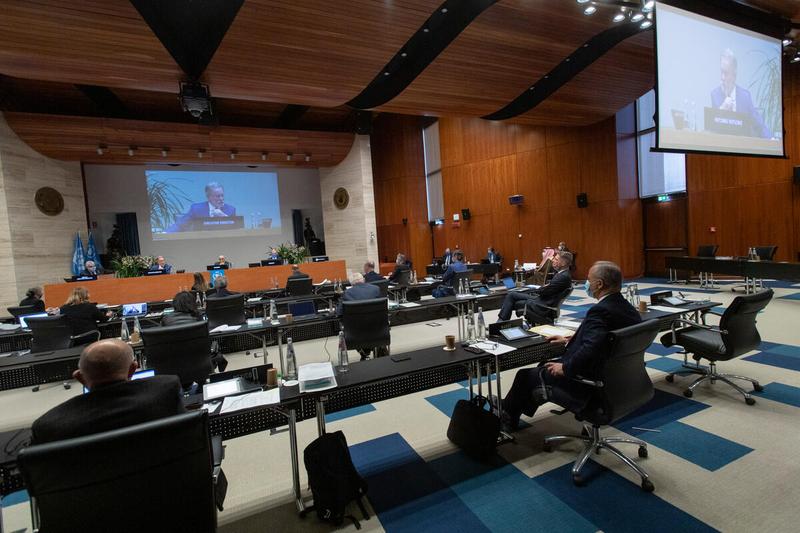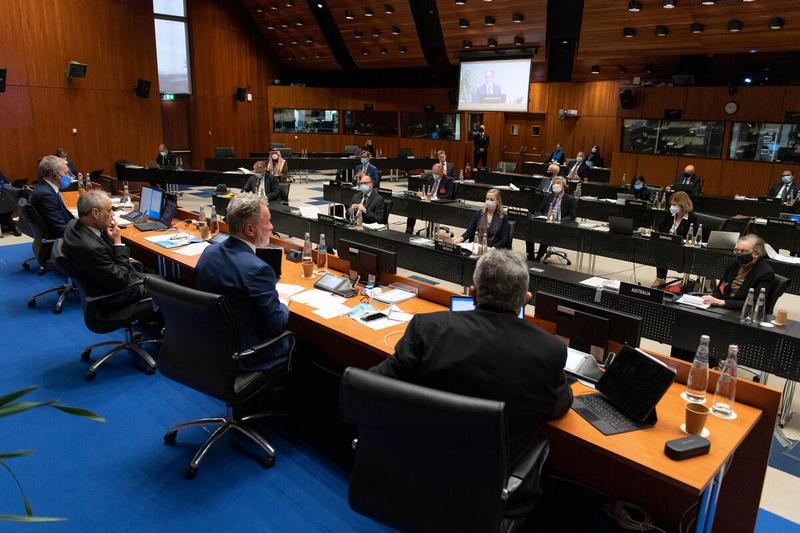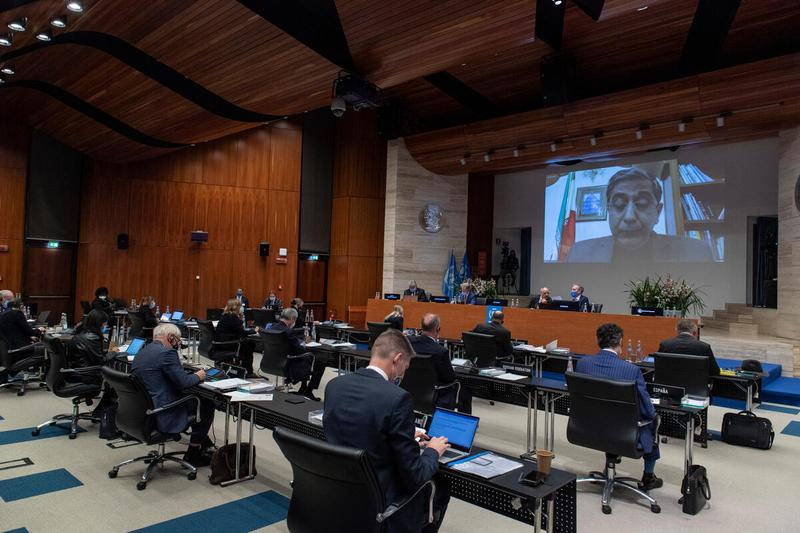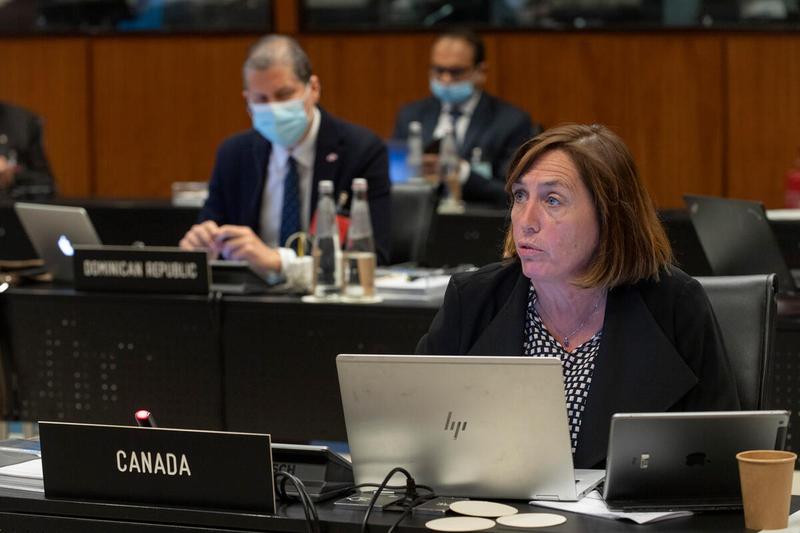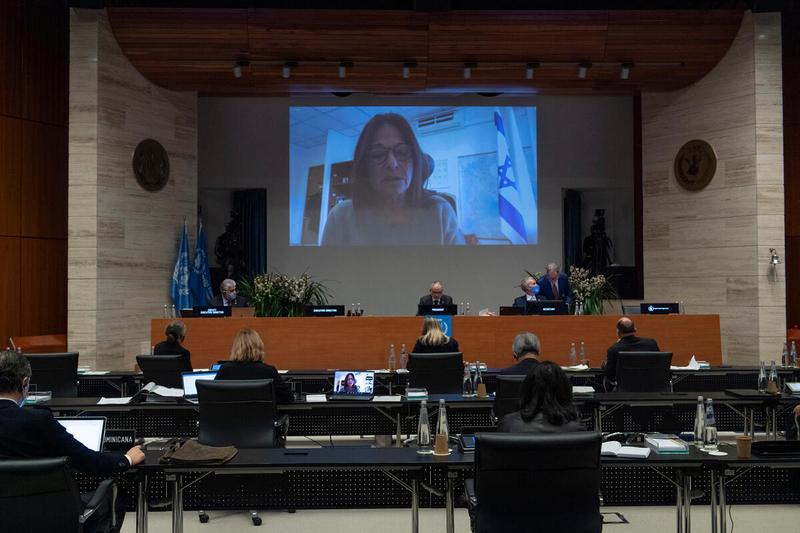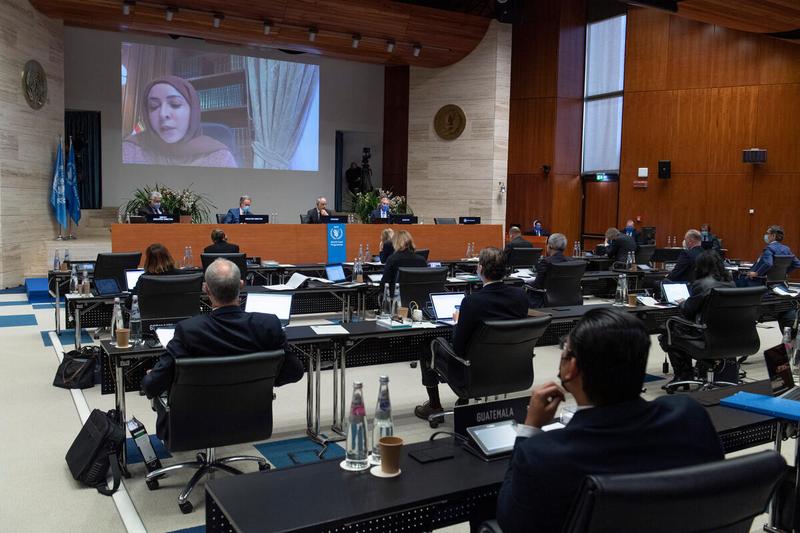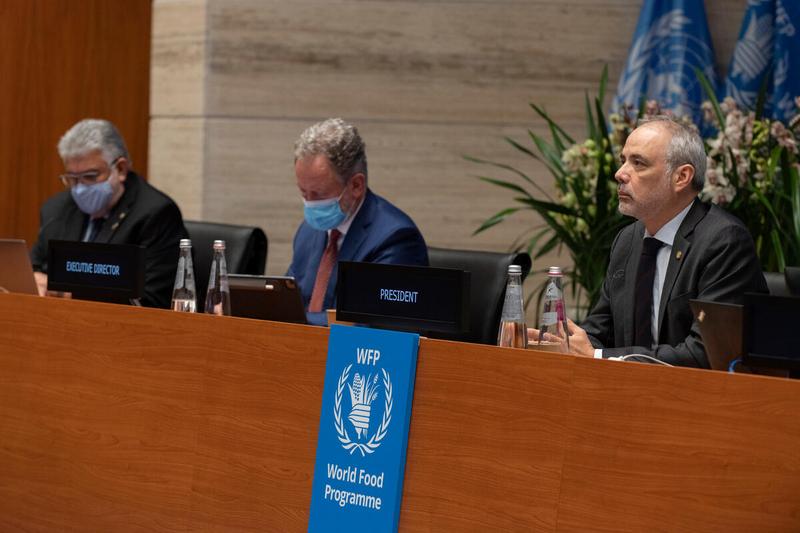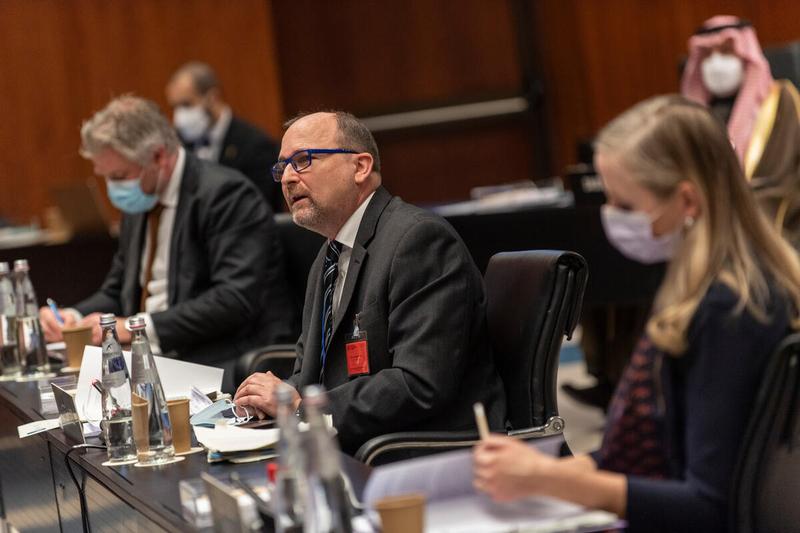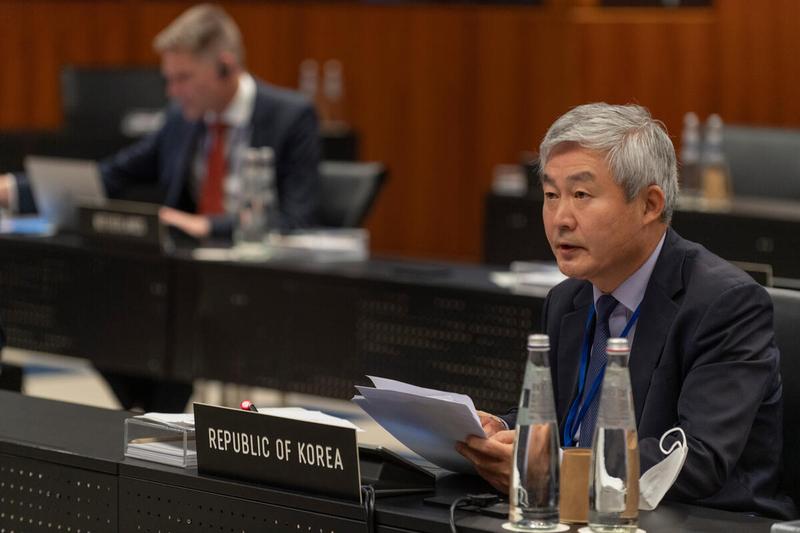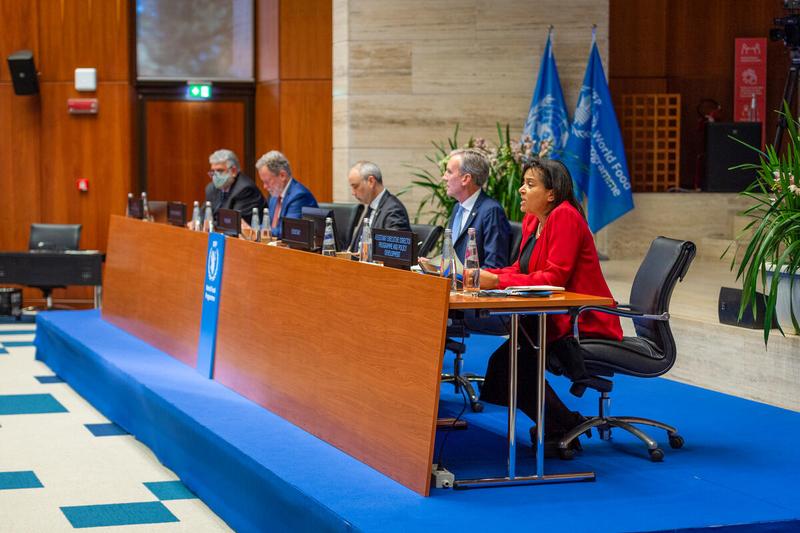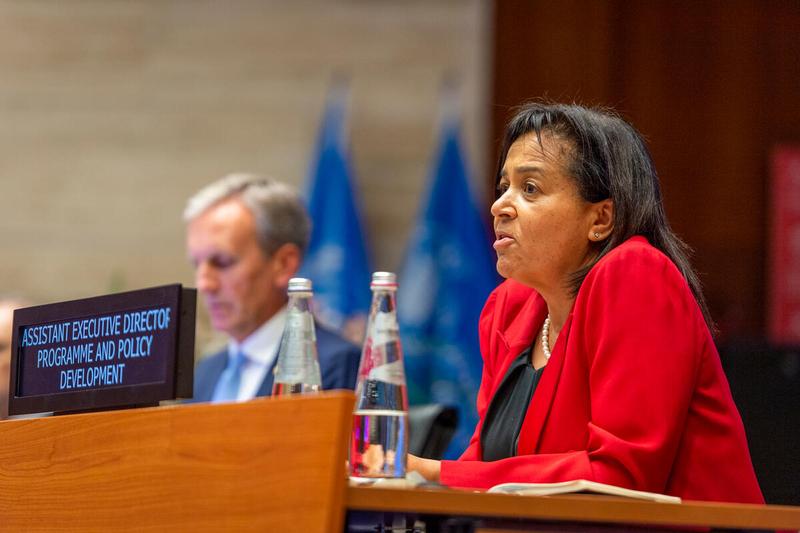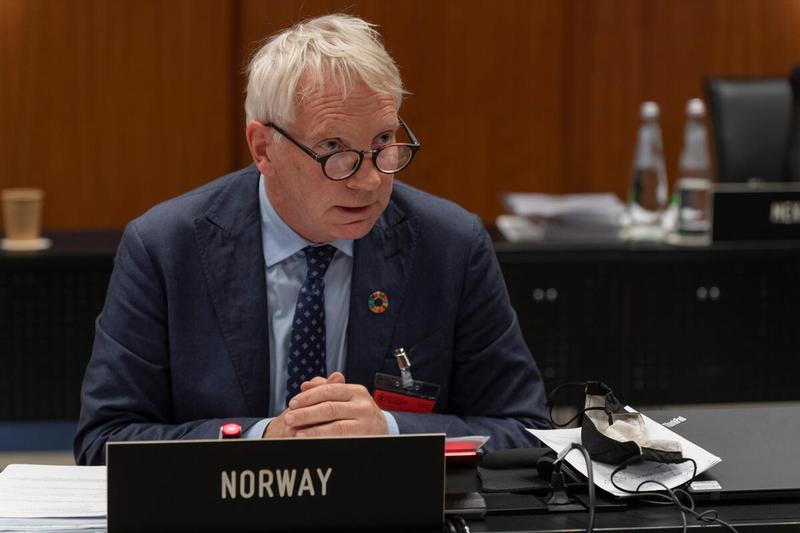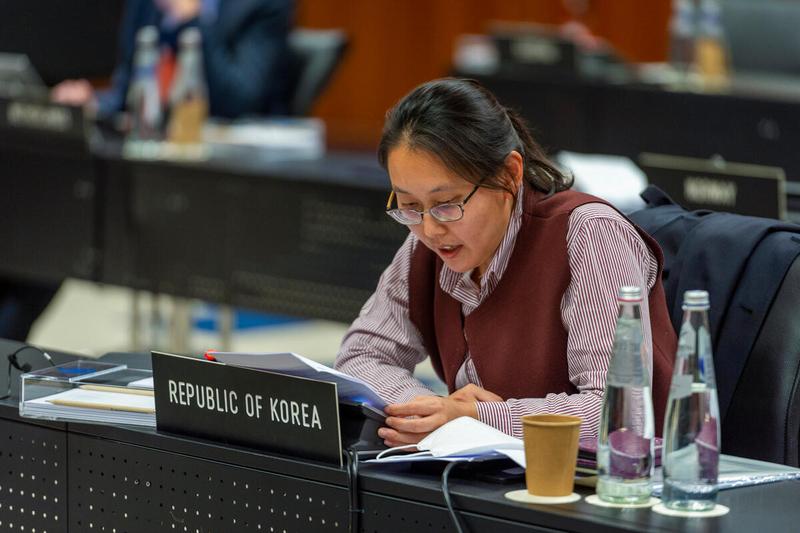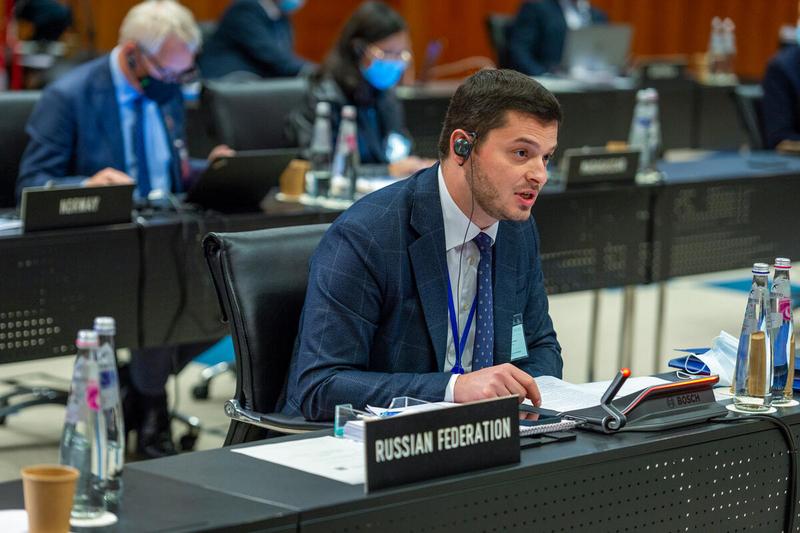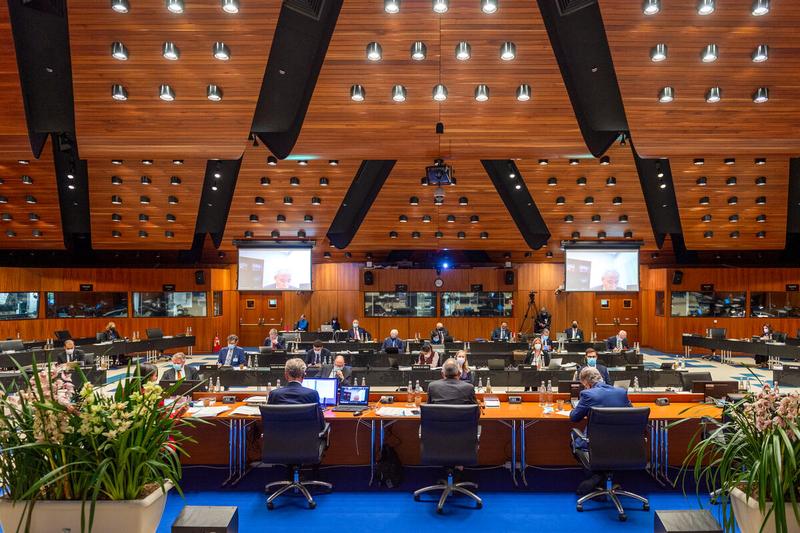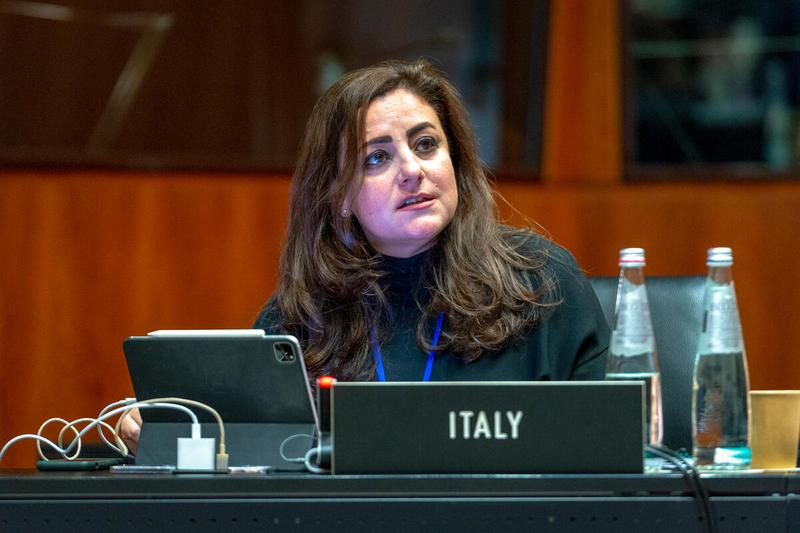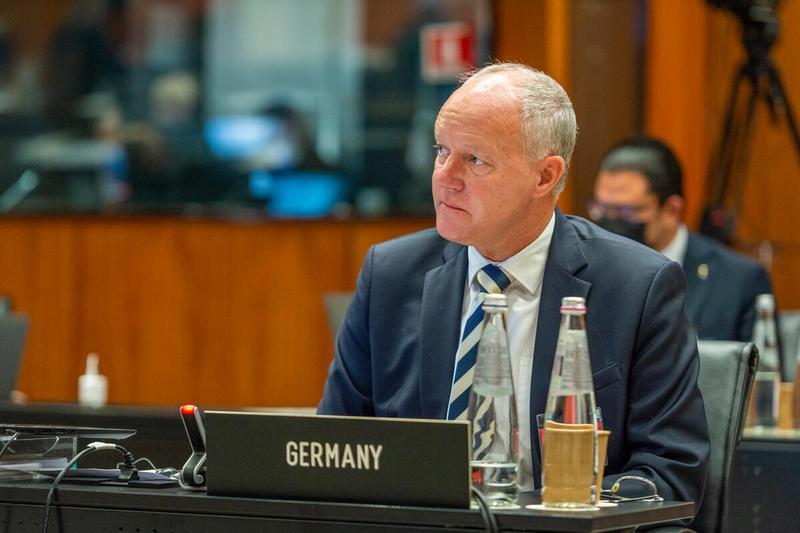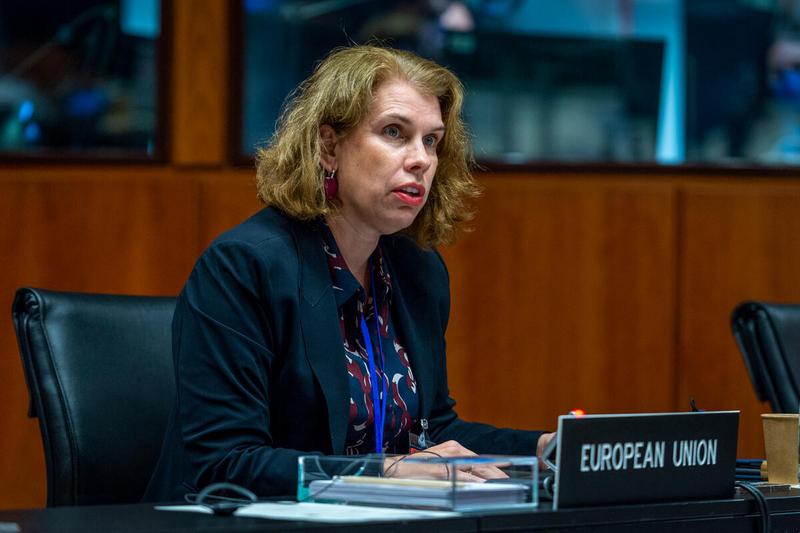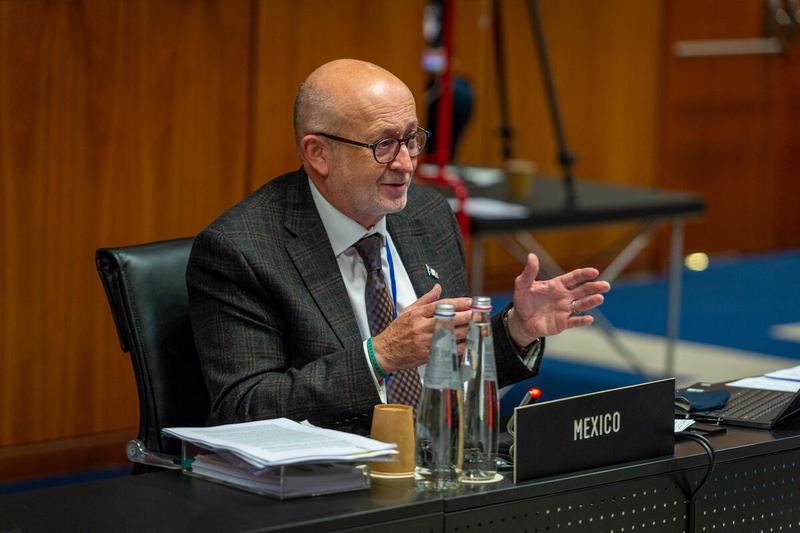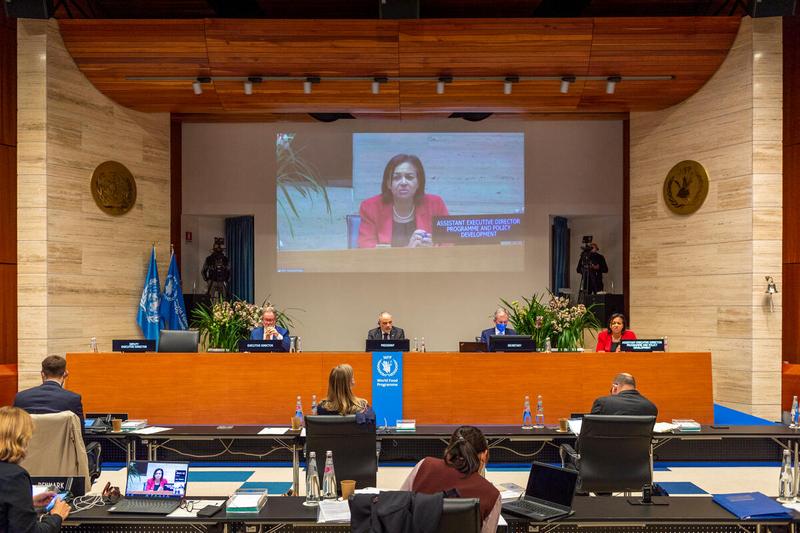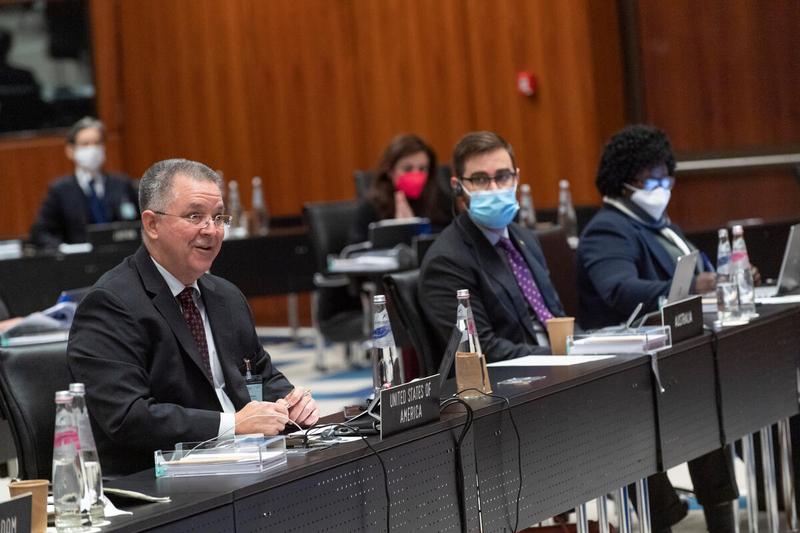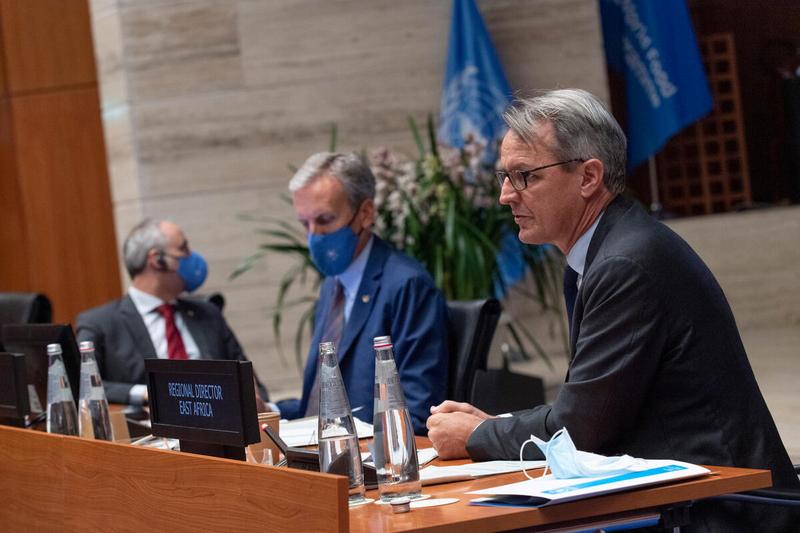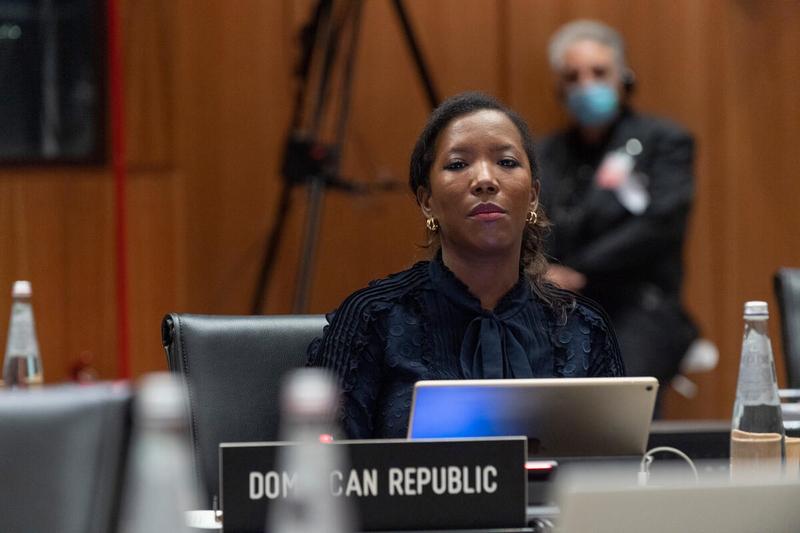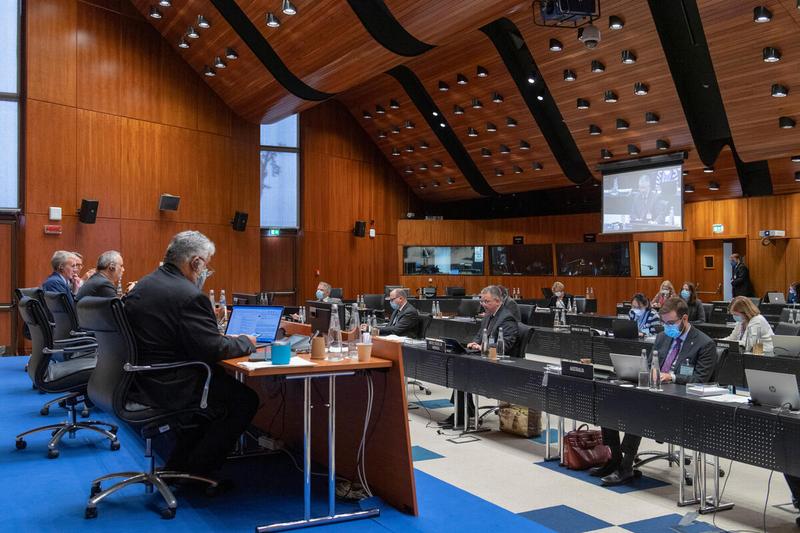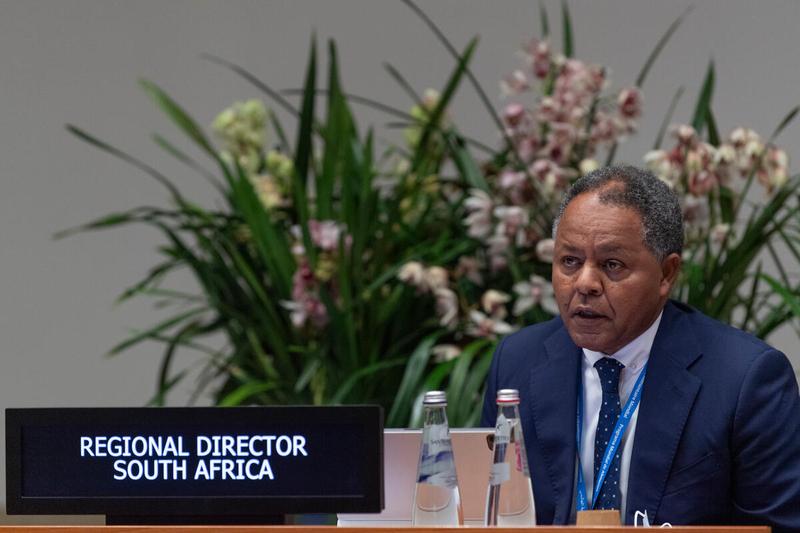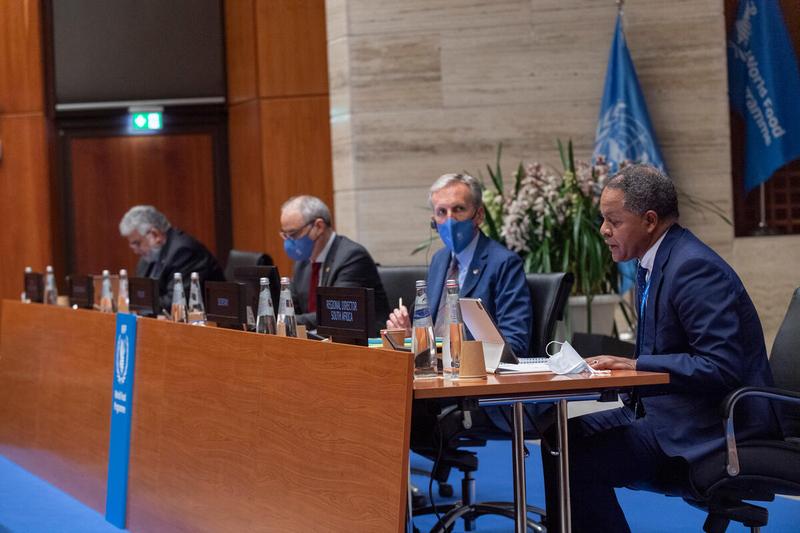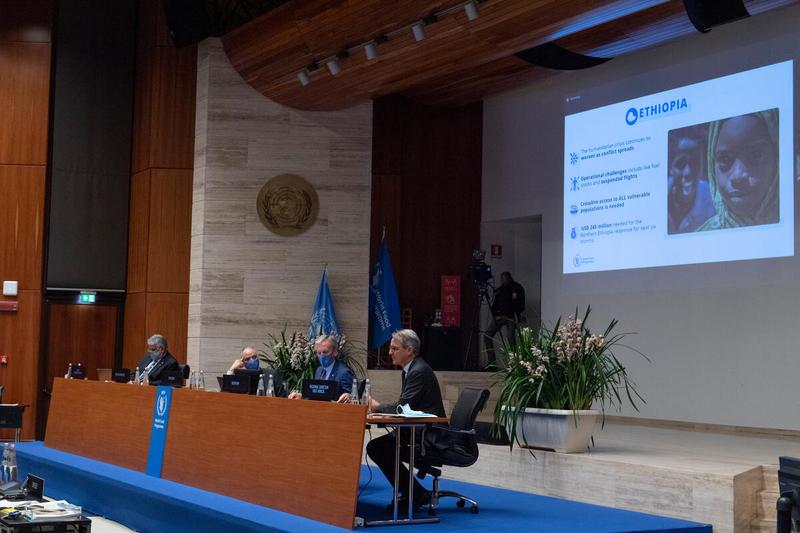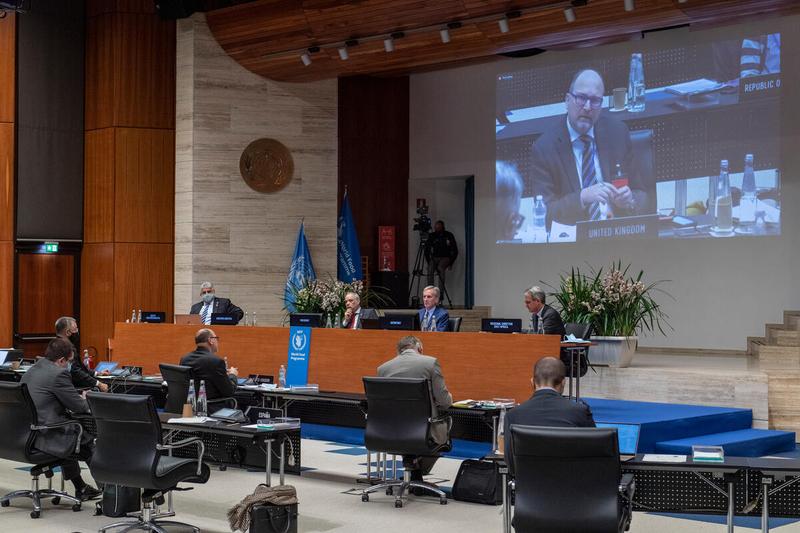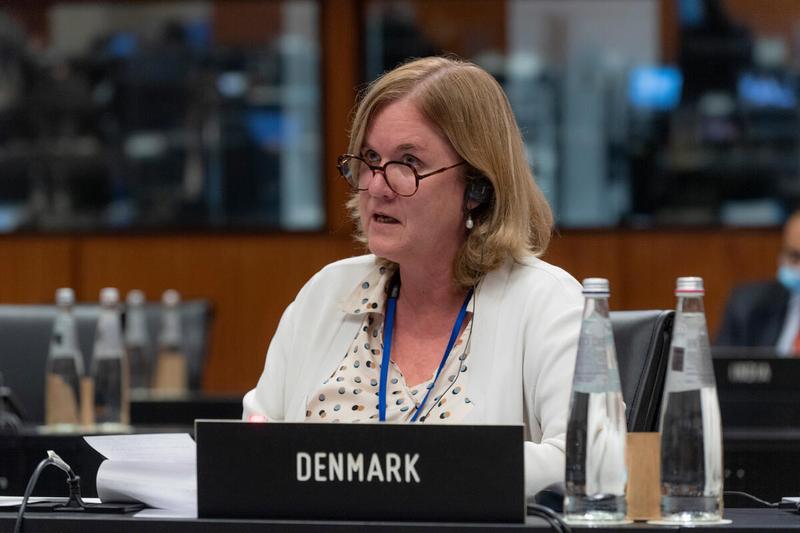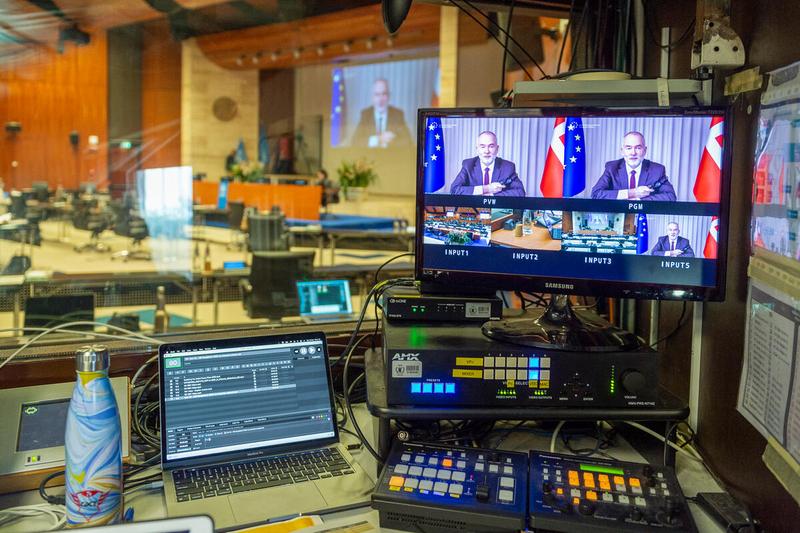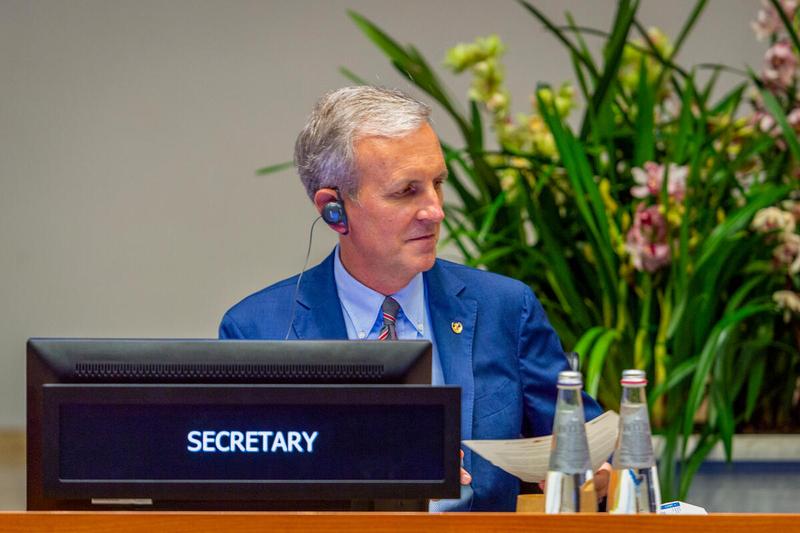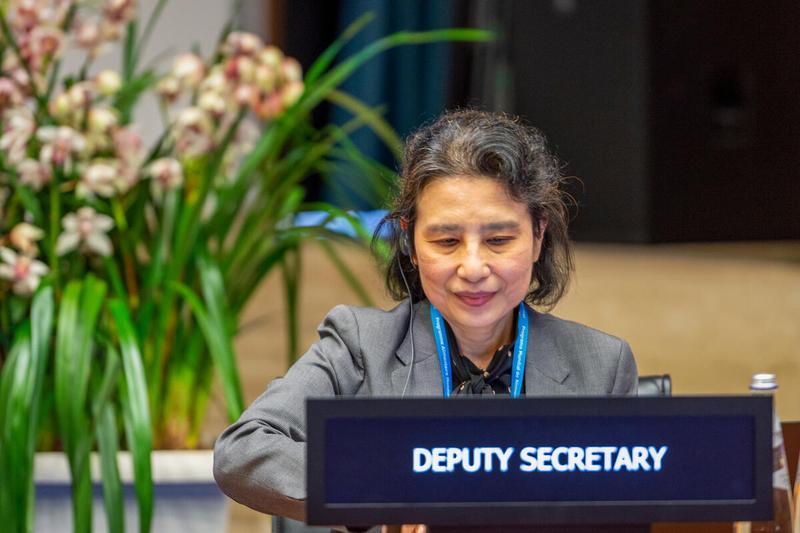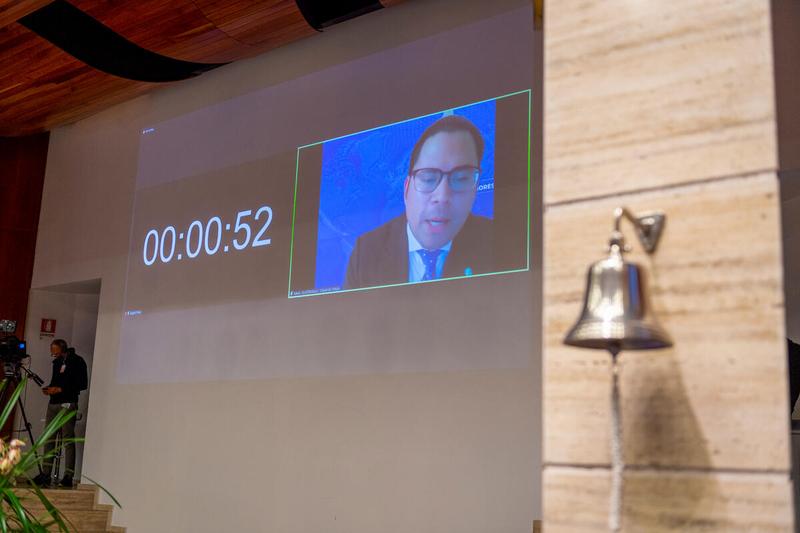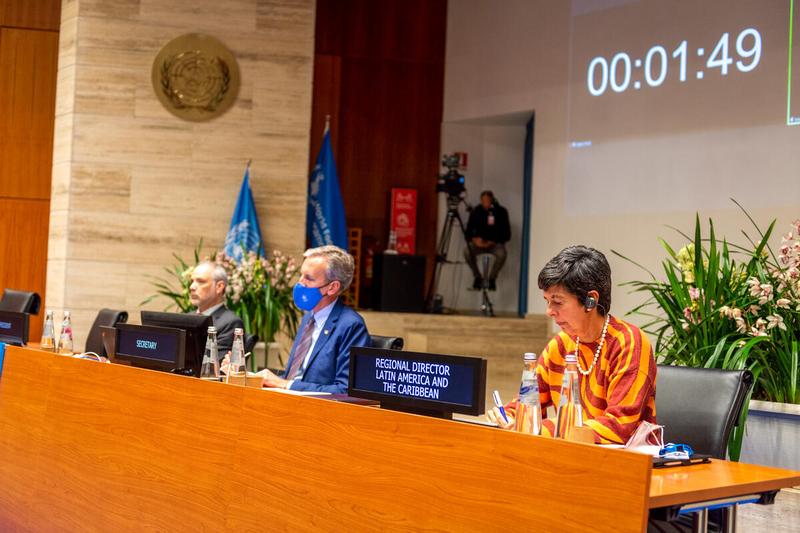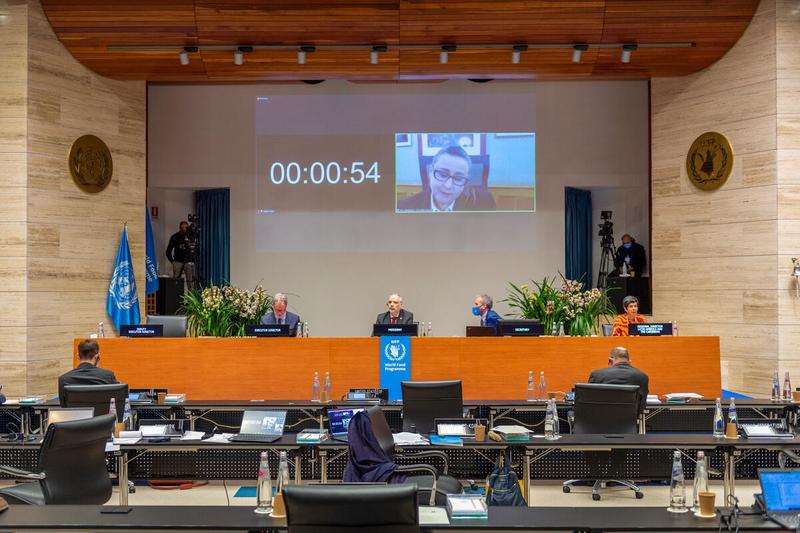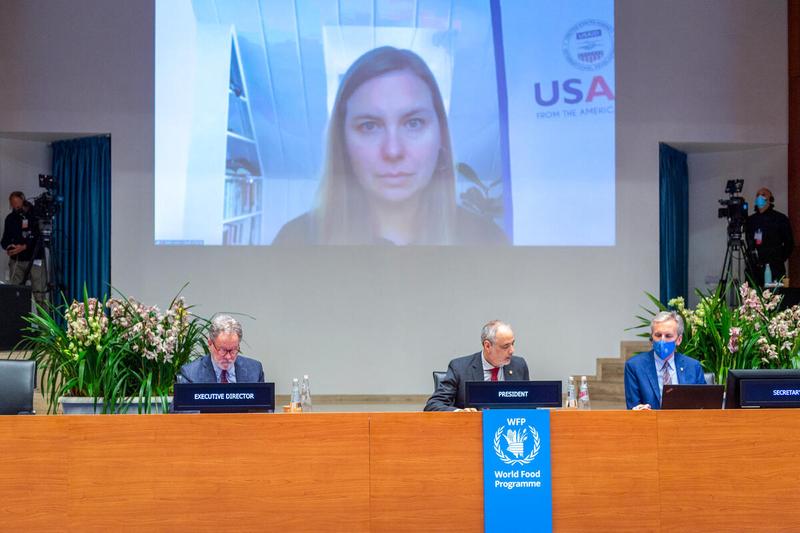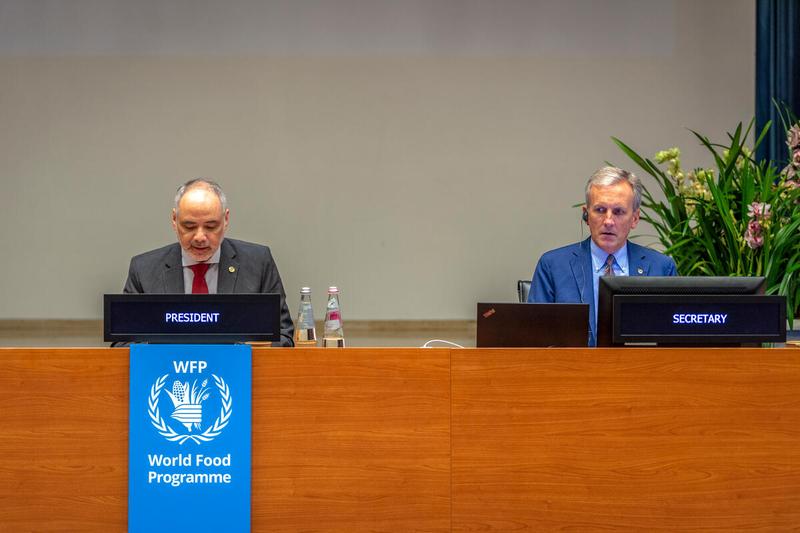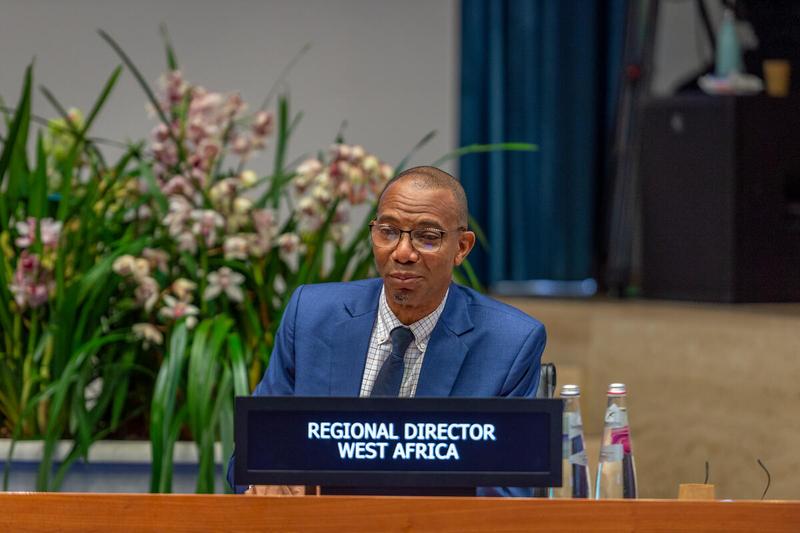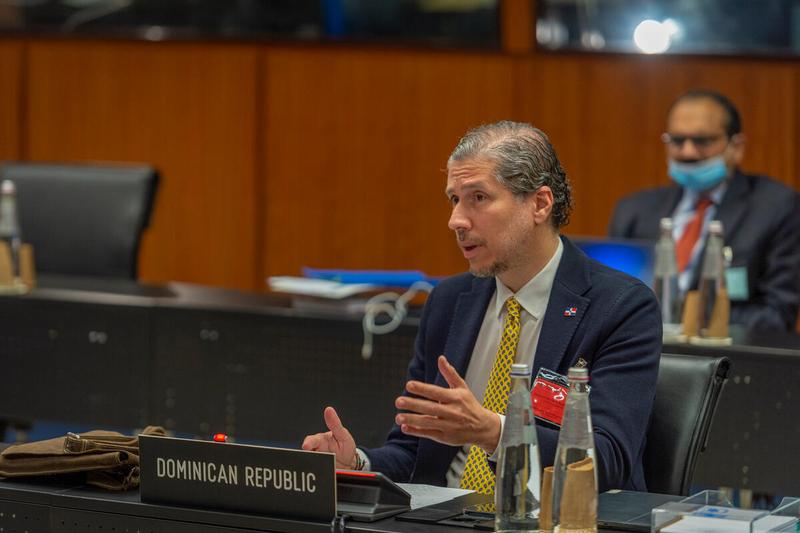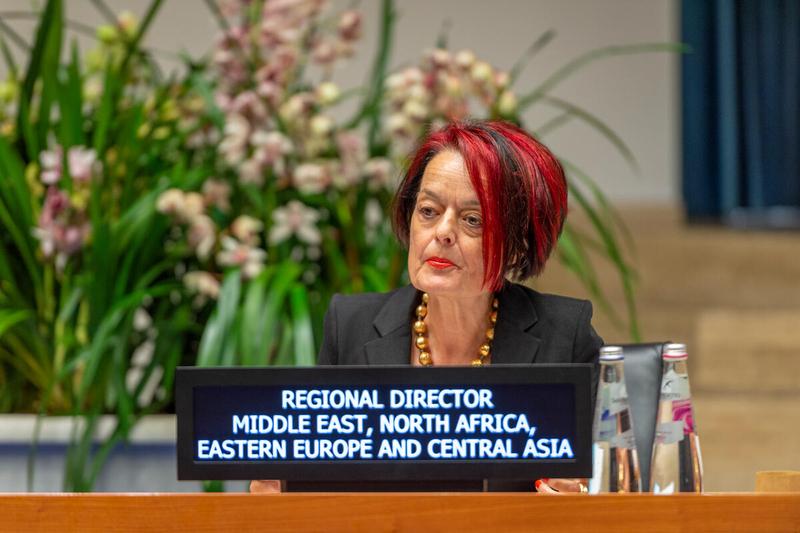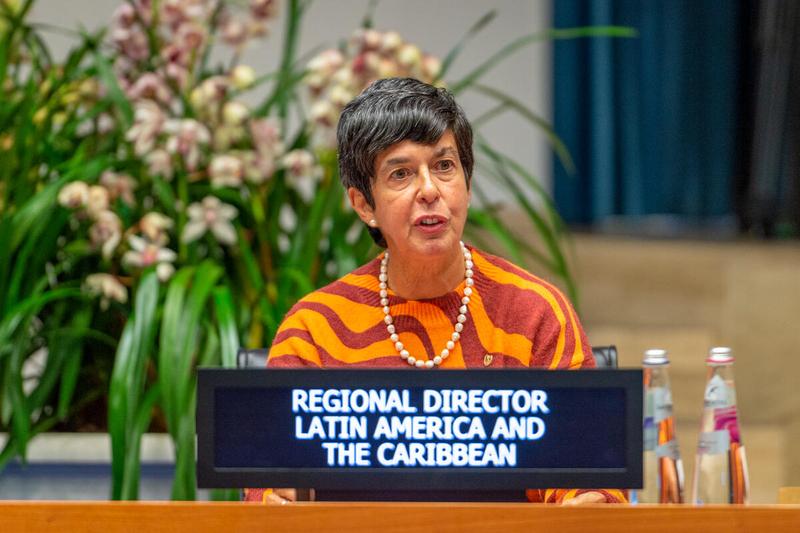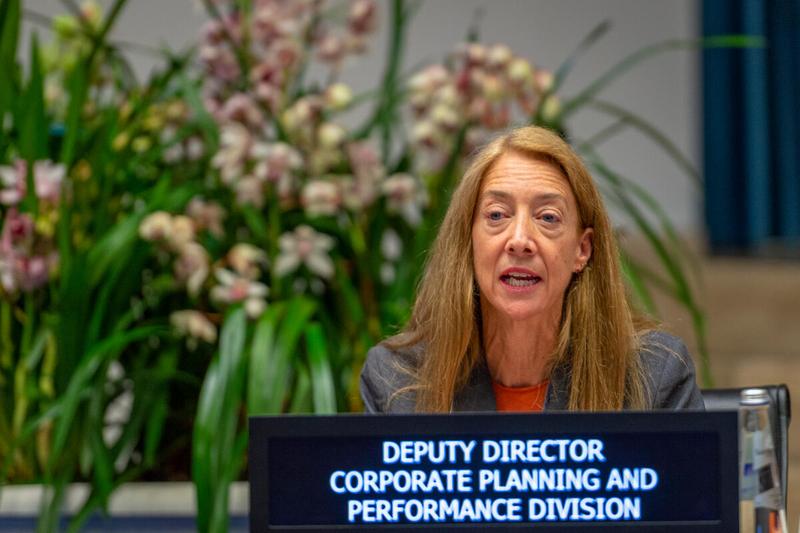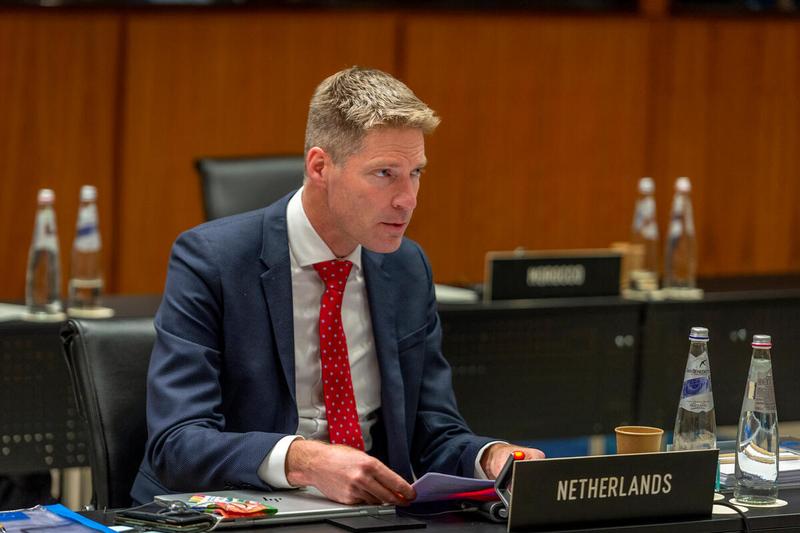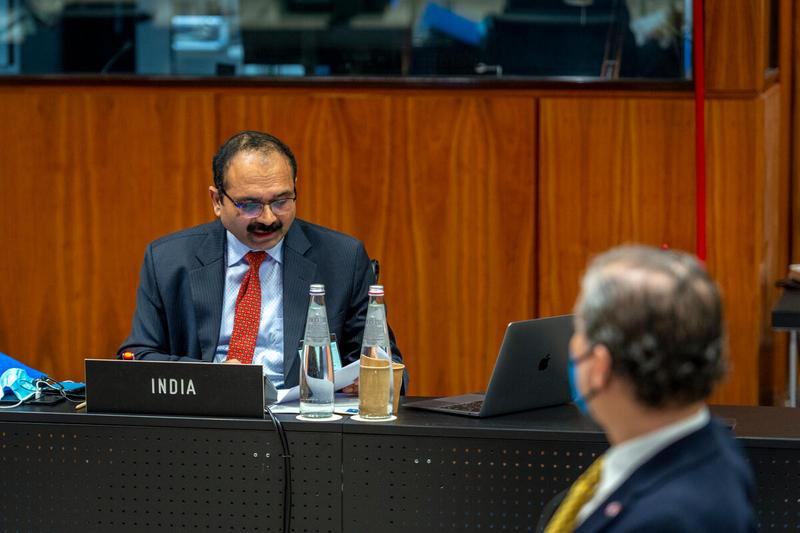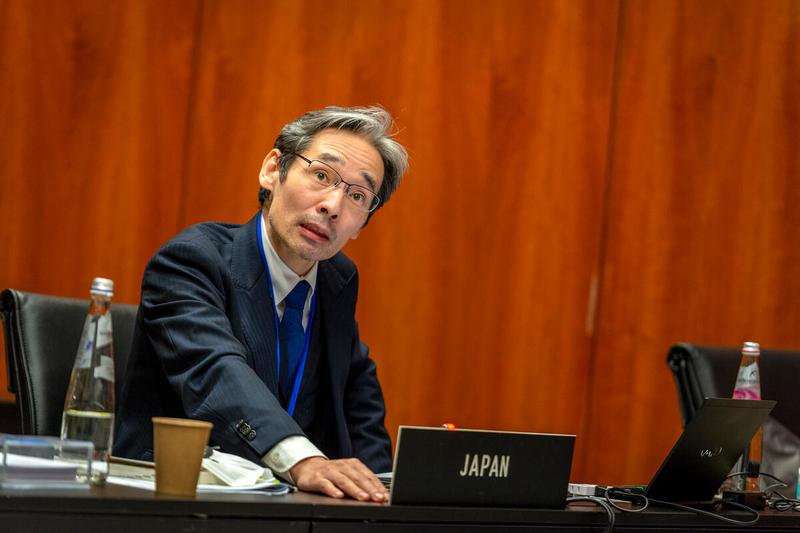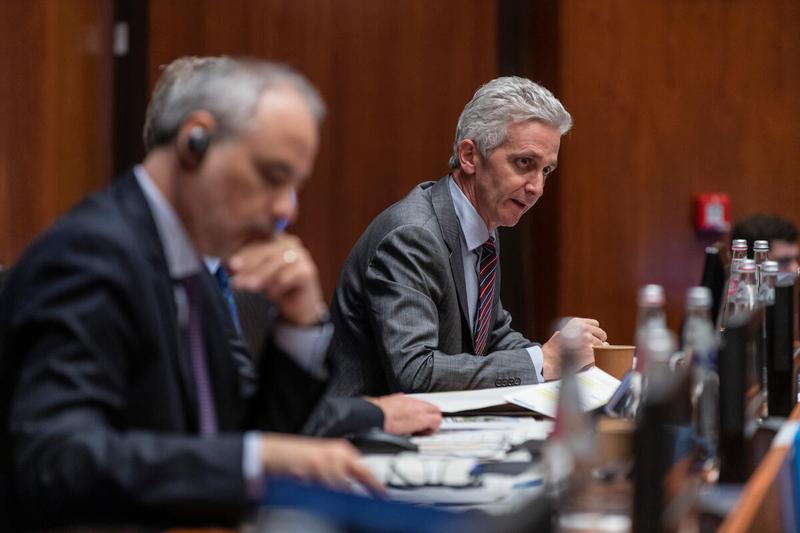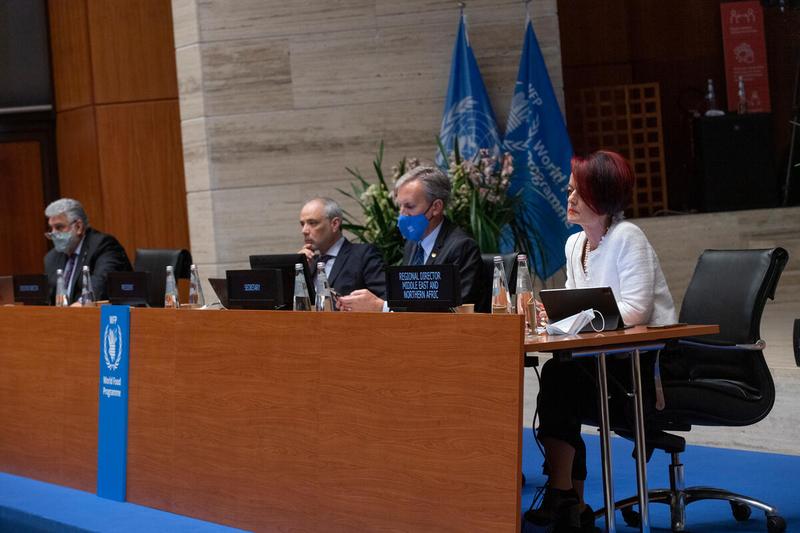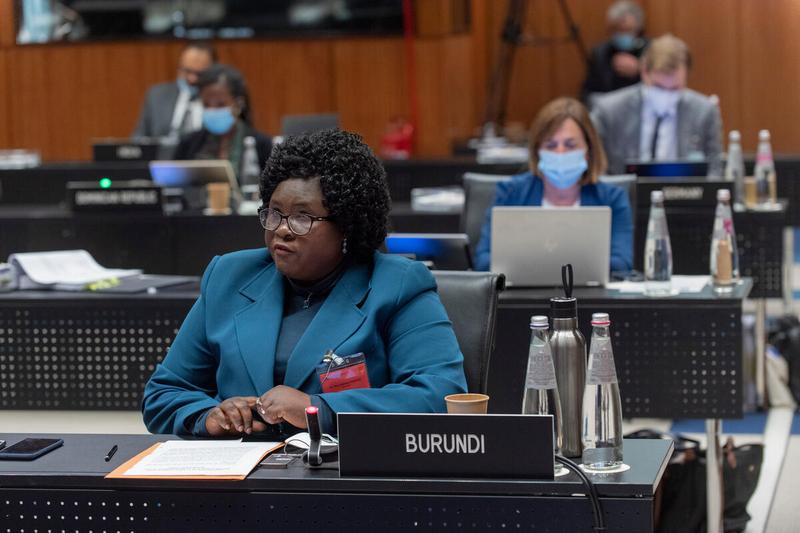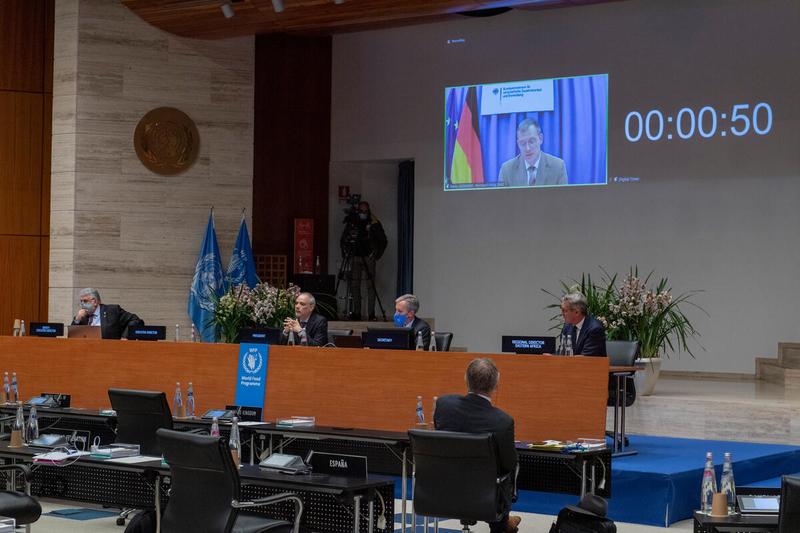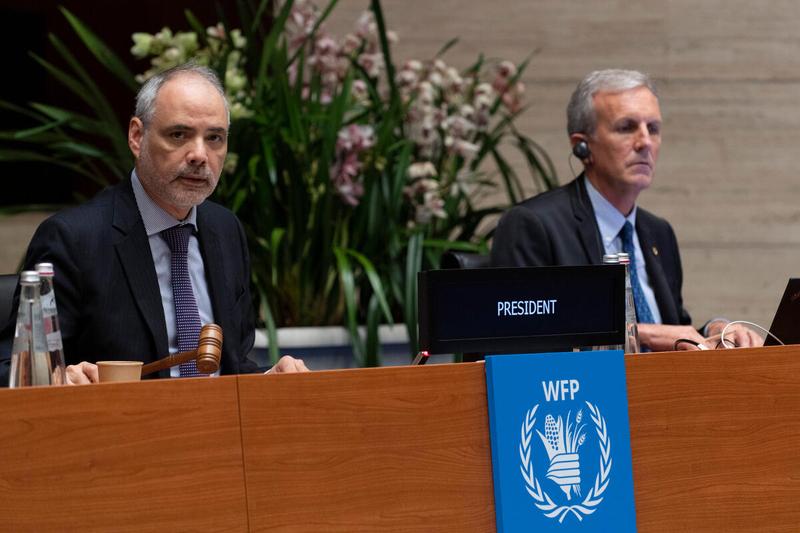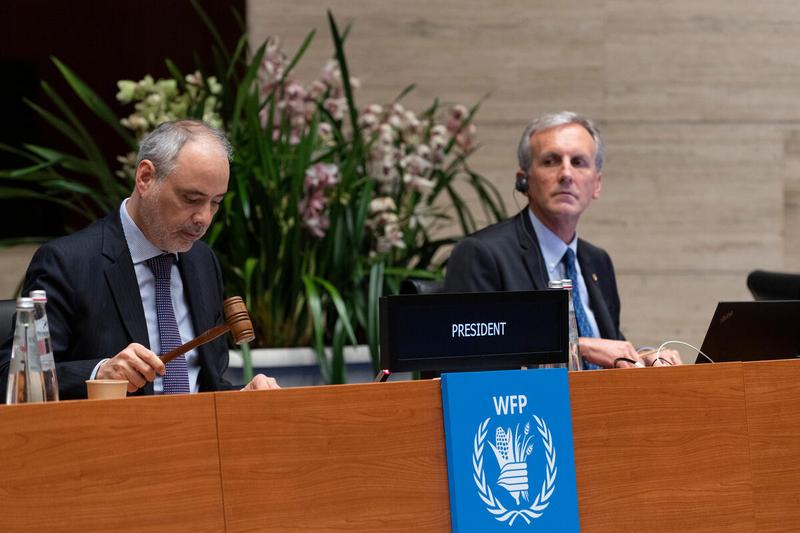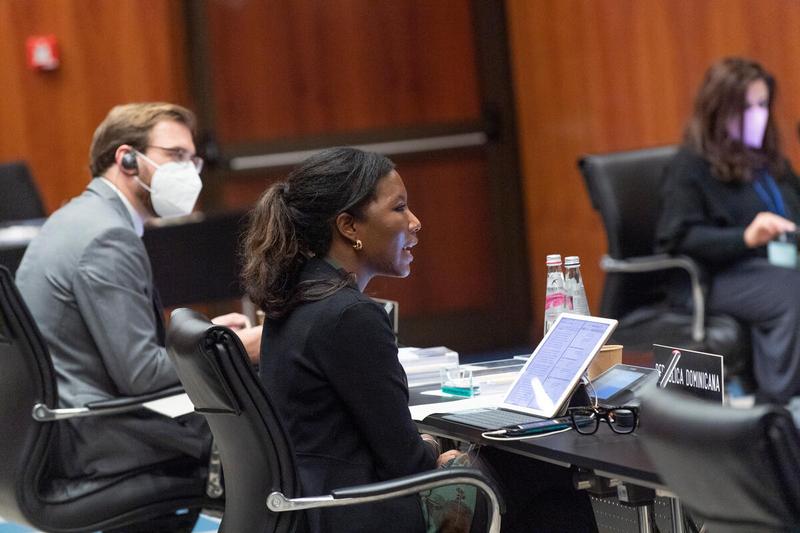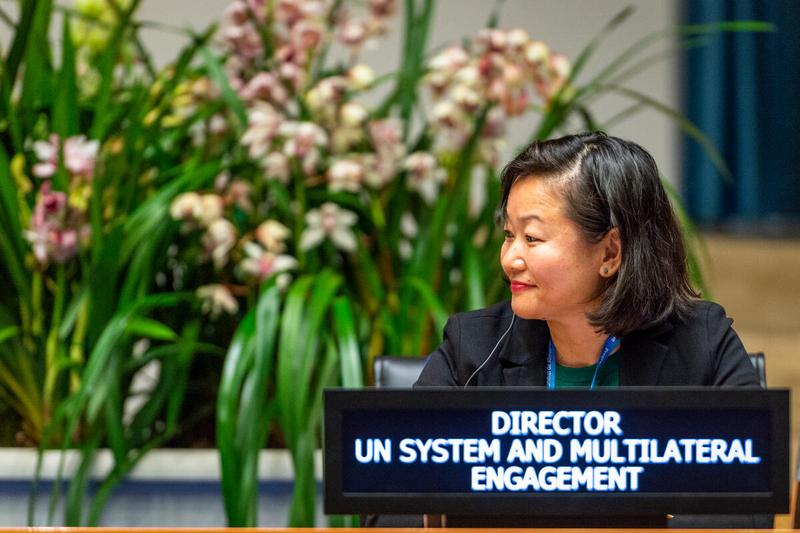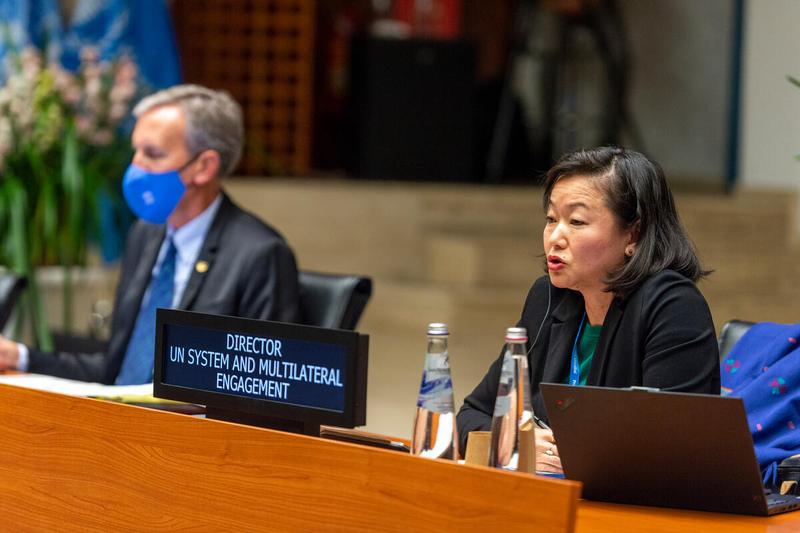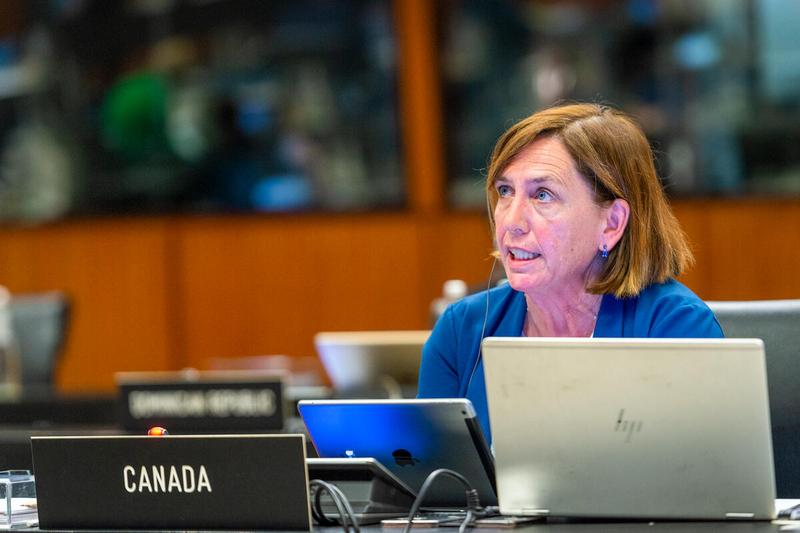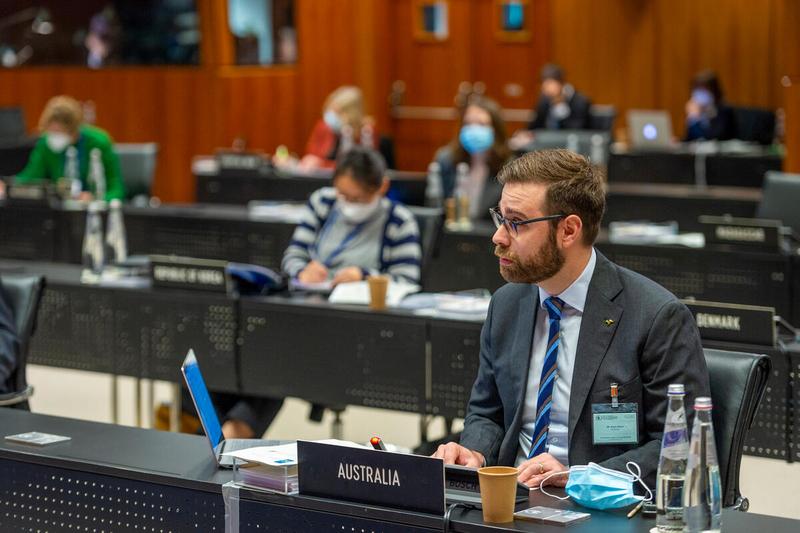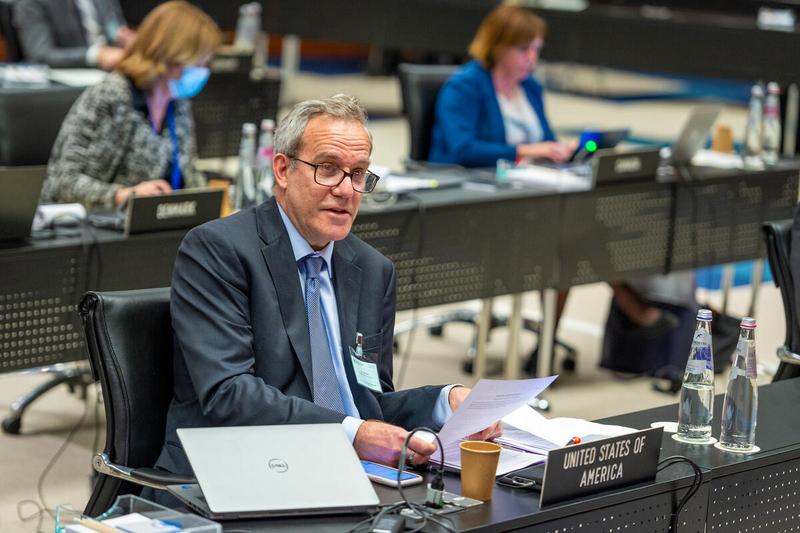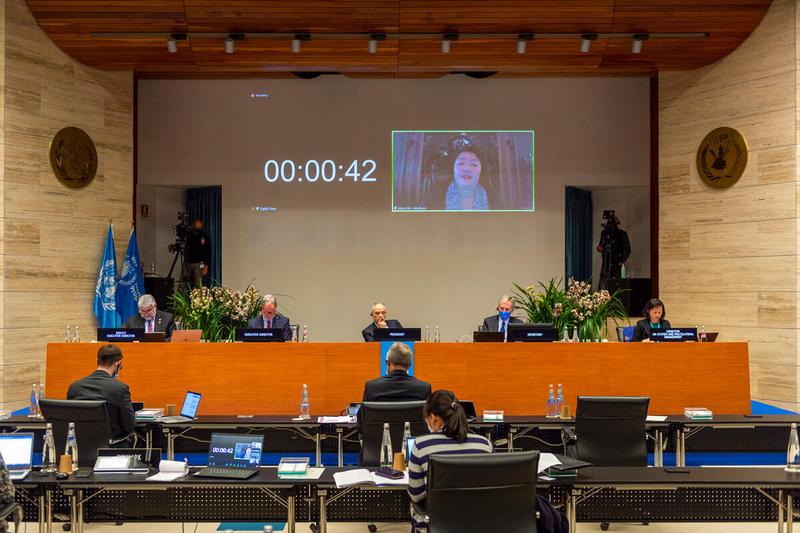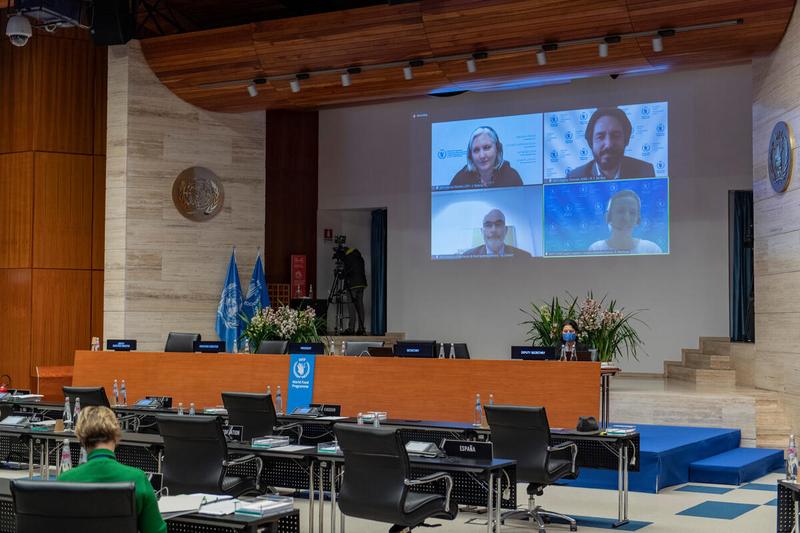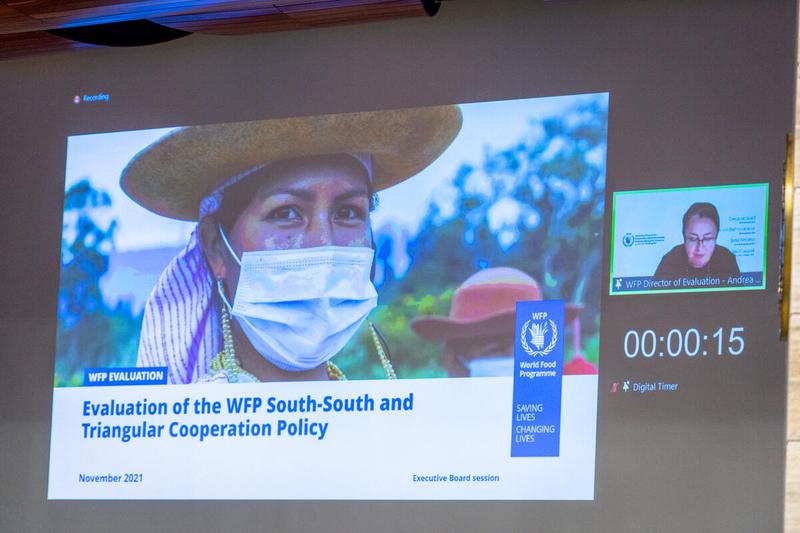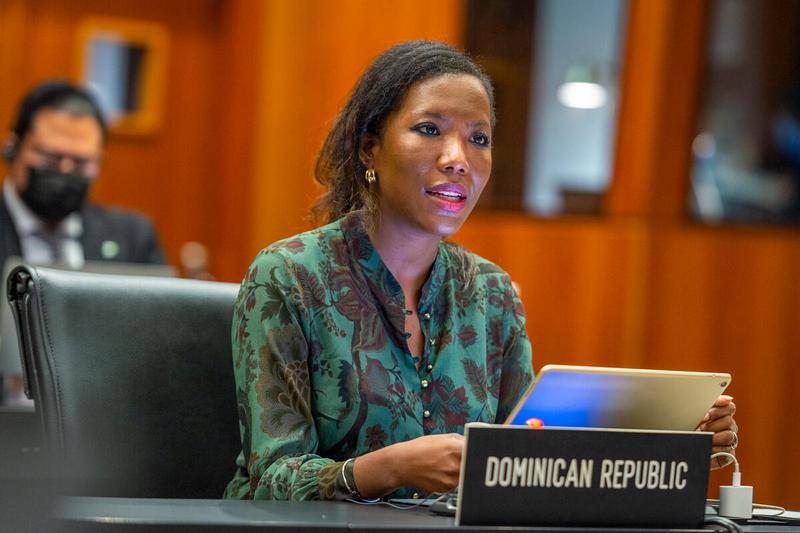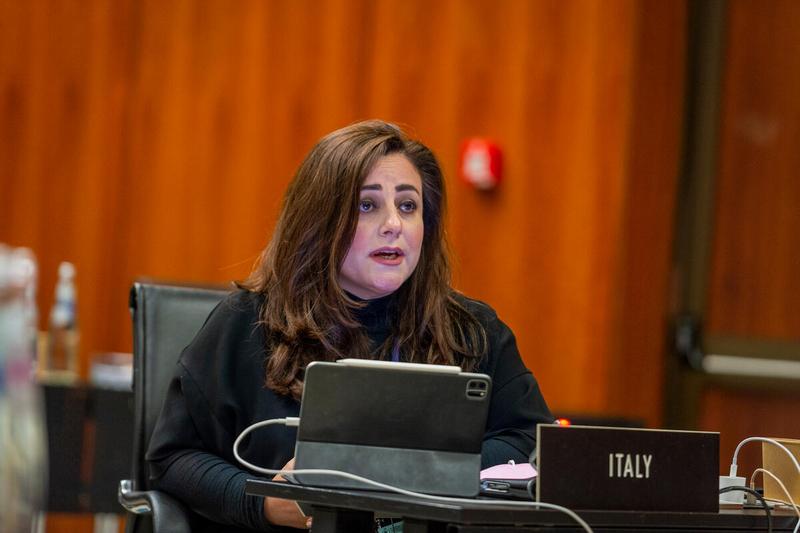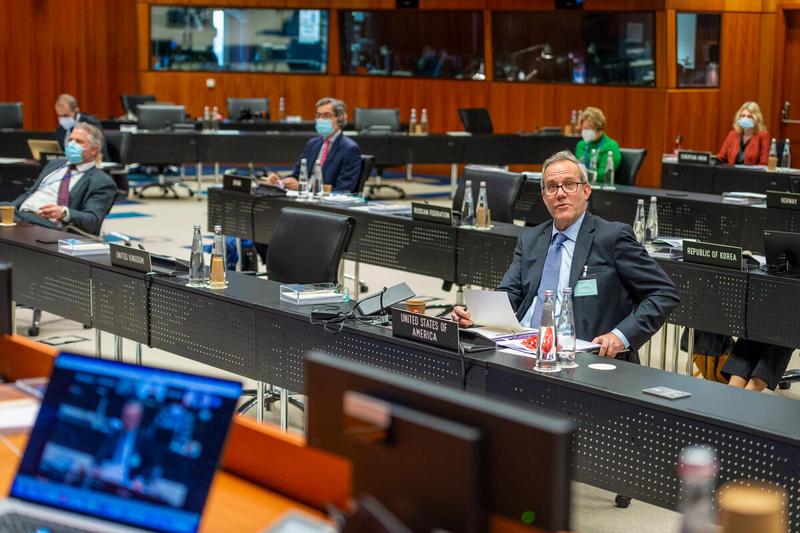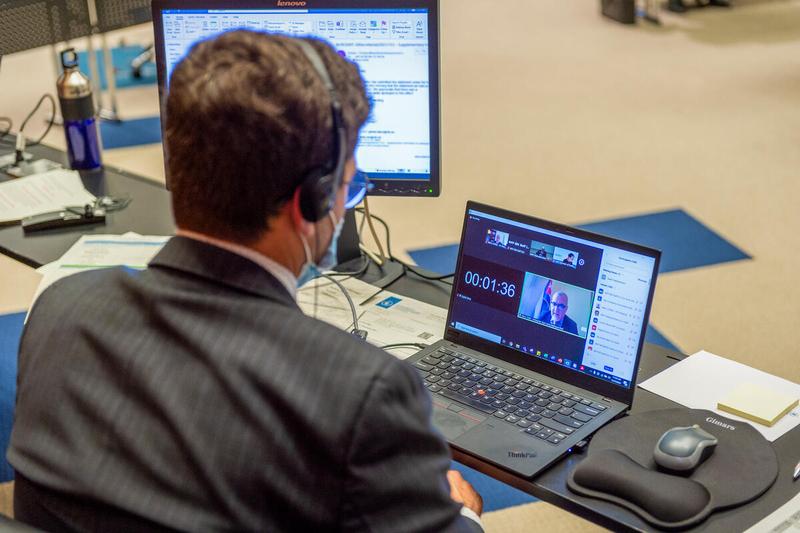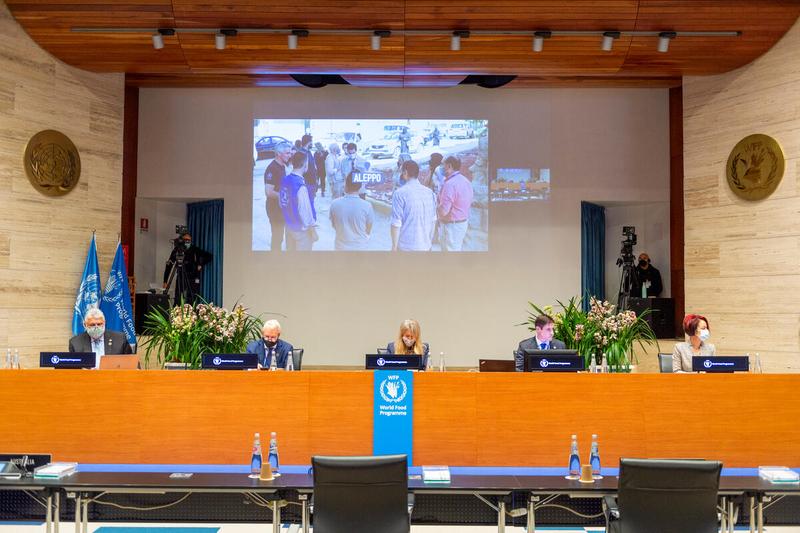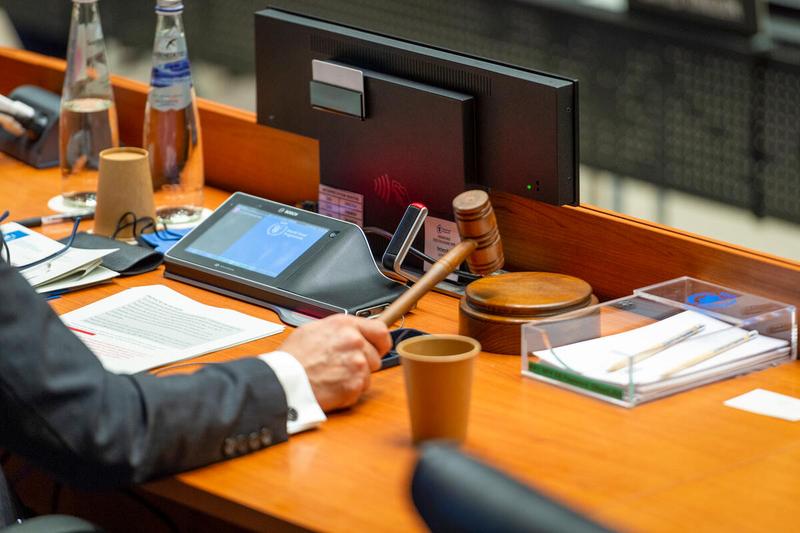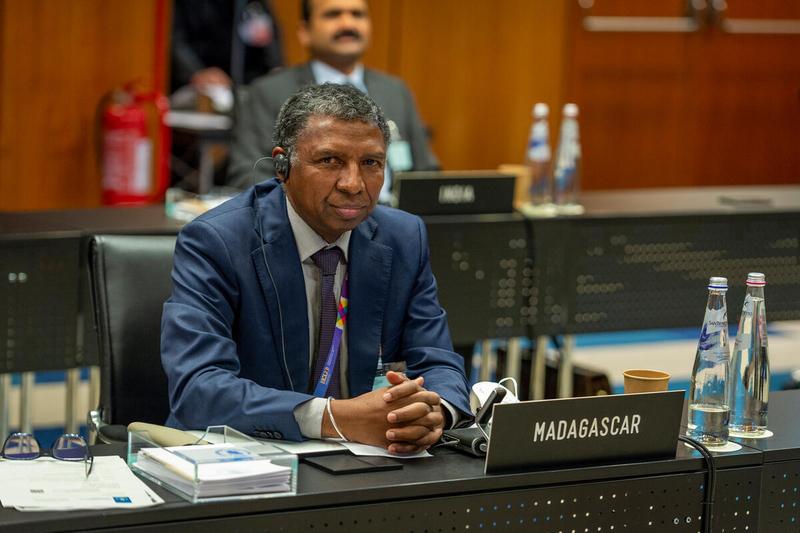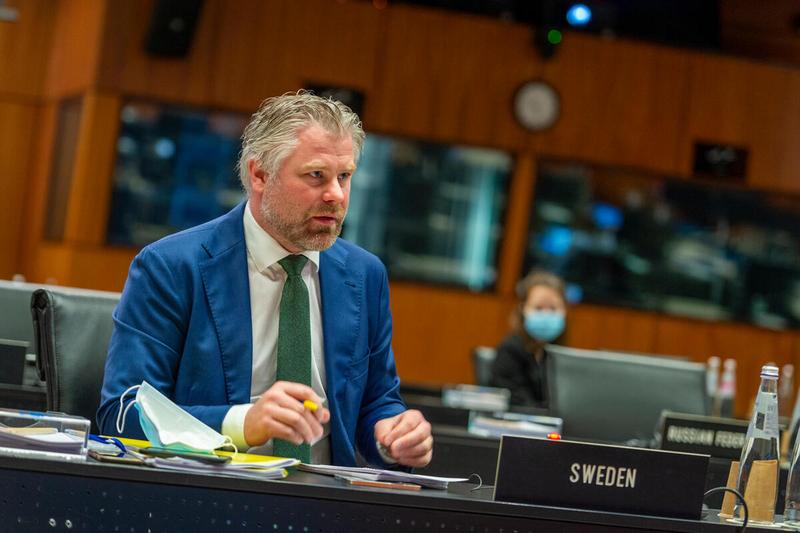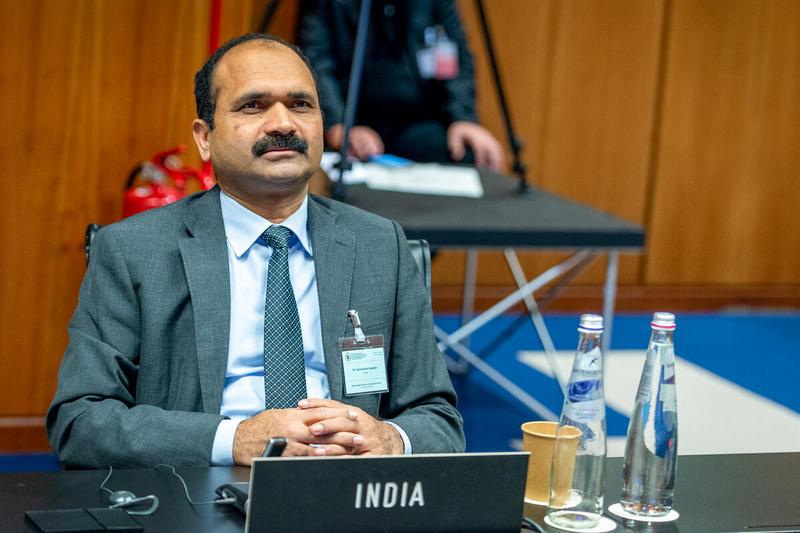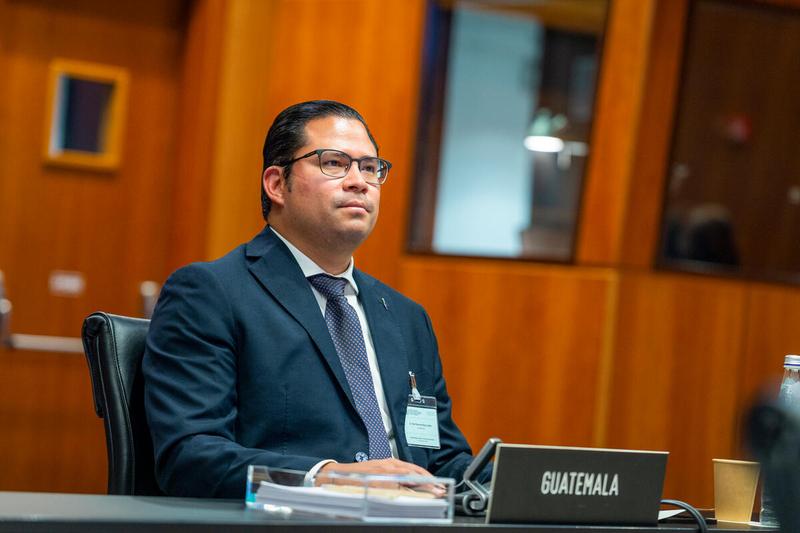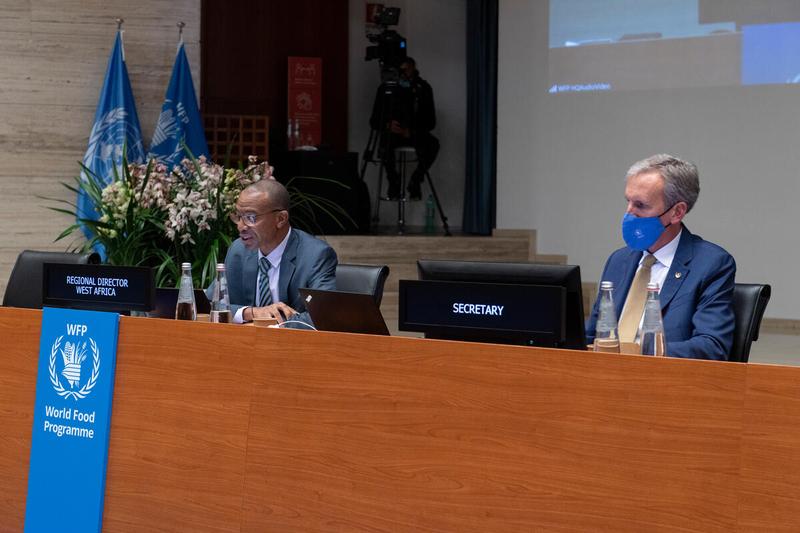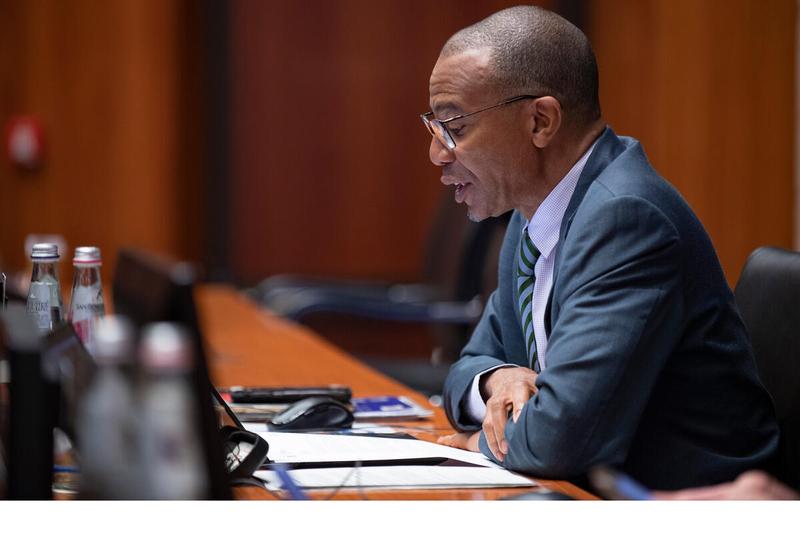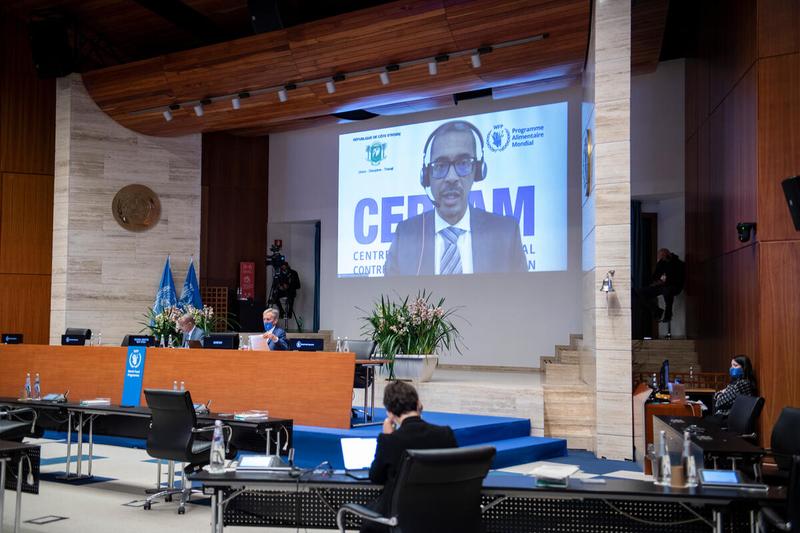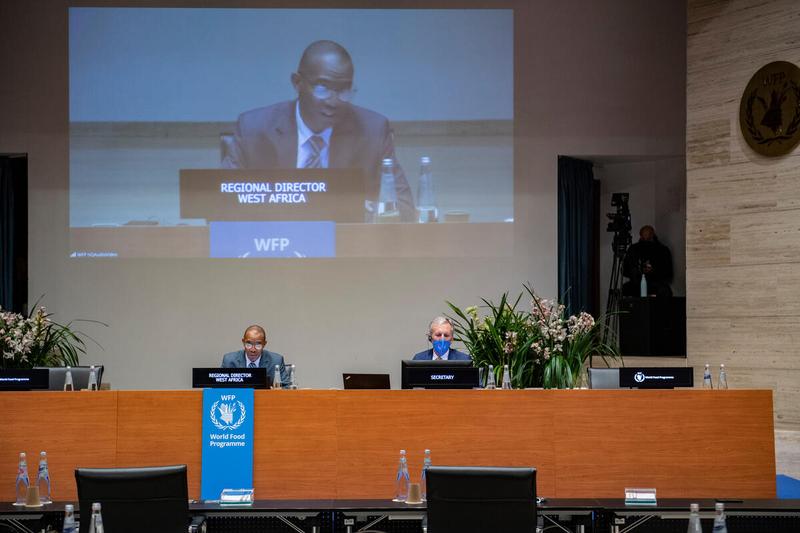The WFP Executive Board has successfully concluded its 2021 second regular session. For the first time it was conducted in a hybrid format, giving Board members a seamless experience being either physically present at the Headquarters or participating online through the digital conferencing platform.

Exploring the Nobel Peace Prize 2020
During the opening segment, H.E. Luis Fernando Carranza Cifuentes, President of the Executive Board, made a few remarks on the last year that has been exceptional not only because WFP has continued to deliver assistance to its beneficiaries during the unprecedented and complex COVID crisis, but also because of the exceptional recognition that WFP received one year ago with the 2020 Nobel Prize. “This well-deserved award has been a strong message in support of this organization’s efforts to combat hunger, for its contribution to bettering conditions for peace in conflict-affected areas and for acting as a driving force in efforts to prevent the use of hunger as a weapon of war” said the EB President.
A short video was projected to commemorate this award showing extracts from “Exploring the Nobel Peace Prize 2020”, a series of high-level dialogues and conferences co-hosted by the WFP Nordic Office and the Nobel Peace Center in Oslo between April and September 2021.
Watch it here, under the “Video” tab.
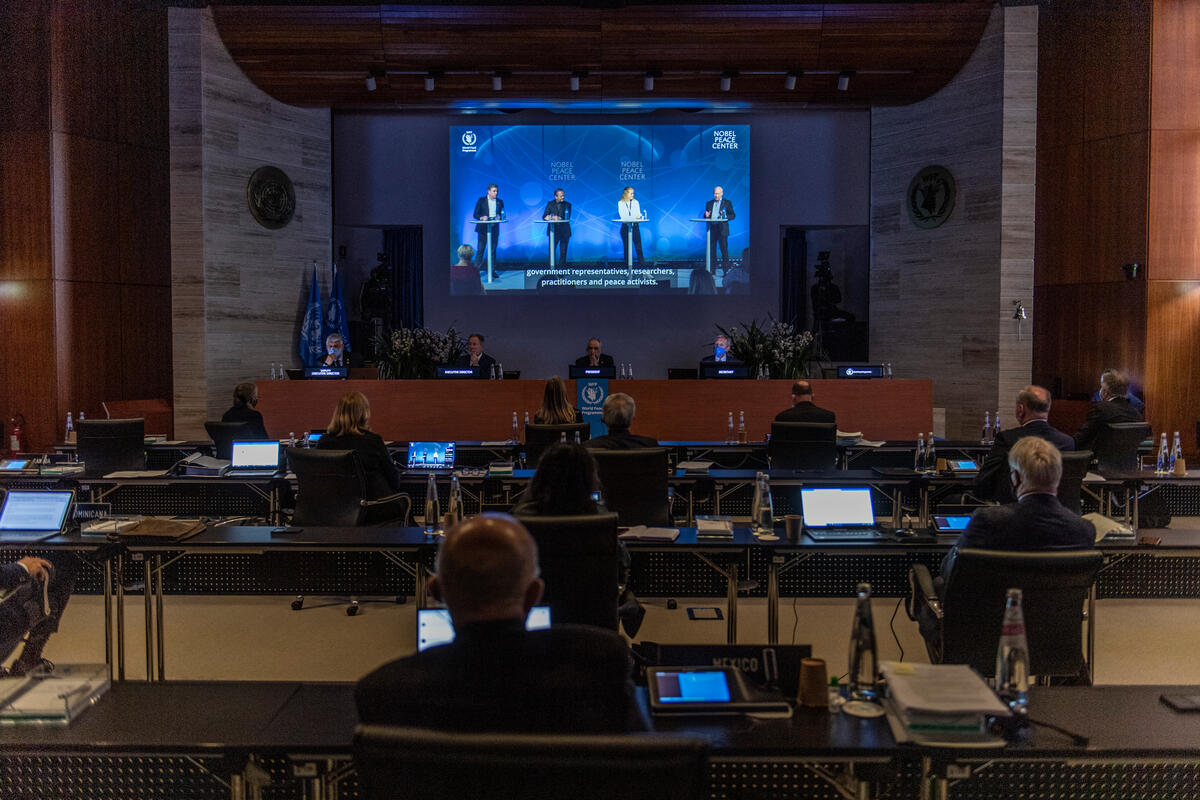
Opening remarks by the Executive Director
In his opening speech, the Executive Director, David Beasley, made an appeal to the EB Permanent Representatives urging them to pledge USD 6.6 billion to assist 45 million people in 43 countries and avert catastrophic famines in 2022. He affirmed that funding is critical to face an unprecedented storm looming due to conflict, climate shocks, Covid and its economic impacts like rising supply chain costs.
“If you do not feed these people, you are going to feed war, conflict and crisis” said Beasley, adding that WFP is also calling for action world’s billionaires. “This is an opportunity for wealthy, successful entrepreneurs to help us in this one-time crisis and engage with us long term. In so many ways they can make us more strategic and end hunger around the world”.
The ED also gave his impressions from his last field visit. In Syria, the economic deterioration continues to take place and the food insecurity situation is worse now than it was at the height of the war – said Beasley. In Afghanistan, where more than half of the population faces acute food insecurity (23 million people out of 40 million), he saw the suffering of children struggling to survive and the desperation of mothers and fathers.
Finally, the Executive Director stressed that not only is the World Food Programme at the frontline of emergency operations, but it also works on sustainability and resilience initiatives, helping communities cope with the impact of climate change. For example, food-assistance-for-assets programmes have allowed to rehabilitate over 3 million acres of degraded land, enabling farming where it was not possible, or insurance schemes helping protect smallholder farmers from climate-related shocks.
Beasley concluded remarking the importance of escalating support to prevent the situation from getting worse in countries like Afghanistan, Syria, Yemen, Madagascar, and the Sahel region. “Maybe one day we will achieve that long sought-after dream, that the World Food Programme is no longer needed around the world. But in the meantime, my colleagues, there is a global hunger crisis and right now it is all hands on deck”.
Click here to read the full speech.
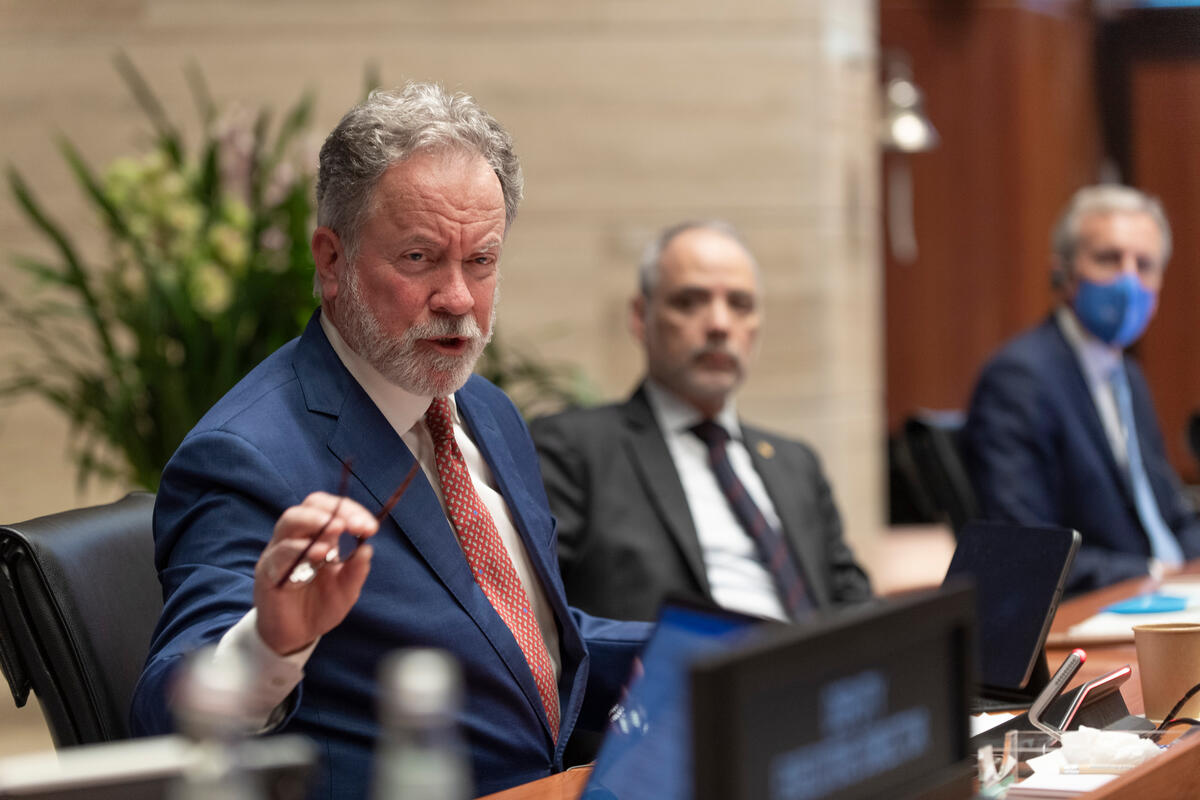
Key Documents
At this session, the Board examined 25 documents for approval or for consideration. In addition, 6 documents were submitted for information.
In particular, the Board approved the WFP strategic plan (2022-2025) that outlines WFP’s vision and plan for the next four years. WFP will focus its action on eradicating hunger and malnutrition (Sustainable Development Goal 2) and strengthening and revitalizing partnerships (Sustainable Development Goal 17).
WFP will use seven principles to guide its action: (1) putting people at the centre of programme design and operational response; (2) promoting humanitarian principles (humanity, neutrality, impartiality and operational independence); (3) strengthening national programmes and systems and enhancing the organizational efficiency, effectiveness and viability of country systems towards achieving zero hunger; (4) adapting implementation to country- and community-specific circumstances; (5) integrating programmes across the entire portfolio and partnerships and operationalizing the humanitarian-development-peace nexus; (6) shifting towards integrated, risk-informed decision making and programming; (7) leveraging accessible technology and data to further become a knowledge- and evidence-driven organization.
The strategic plan for 2022–2025 includes five outcomes that WFP will work towards in collaboration with others. Three are relevant to SDG 2 and two to SDG 17.
Achieving zero hunger (SDG 2) involves contributing to the following outcomes:
- people are better able to meet their urgent food and nutrition needs;
- people have better nutrition, health and education outcomes; and
- people have improved and sustainable livelihoods.
Effective collaboration and partnership within and between the humanitarian, development and peace sectors (SDG 17) depends on the following outcomes:
- national programmes and systems are strengthened; and
- humanitarian and development actors are more efficient and effective.
In addition, the WFP Management Plan (2022-2024) was approved with a 2022 programme support and administrative appropriation of USD 496.1 million.
Four Country Strategic Plans (CSPs) and one Interim Country Strategic Plans (ICSPs) were approved: Bangladesh; Laos; Somalia; Tunisia and Syrian Arab Republic.
Among the evaluation reports, Summary report on the evaluation of the WFP South-South and triangular cooperation policy and its management response, Summary report on the joint evaluation of the United Nations Rome-based agency collaboration, and its coordinated response to the recommendations and summary reports on the evaluations of China, Gambia, Laos and Lebanon CSPs.
Click here to read all decisions and recommendations.

Side events
Five hybrid side events were held on the margins of this second regular session of the Executive Board.
On Tuesday, 16 November, the Governments of Norway, Germany, Denmark and Switzerland sponsored the side event “Anticipating Climate Shocks”.
Mr Jesse Mason, Global Coordinator for Anticipatory Actions in WFP, moderated discussion on the role of early warning systems to enable timely and accurate anticipatory actions before climate-related hazards occur. This forward-looking risk management approach consists in releasing prearranged finance for pre-agreed interventions, protecting more lives, minimizing losses and damages and reducing the costs of humanitarian assistance in their aftermath.
The panel showed the successes and challenges of these programs implemented in such countries as Ethiopia, Kenya, Zimbabwe and Nepal and talked about impacts and lessons learned.
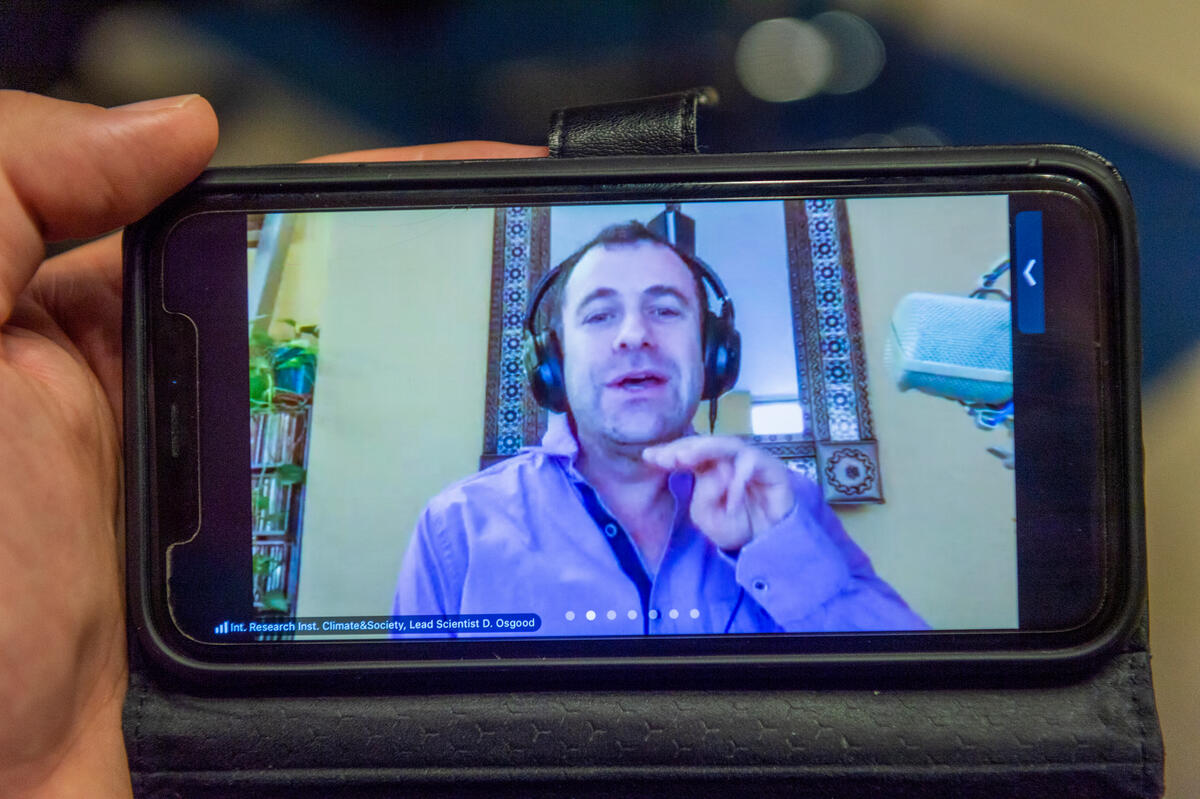
On Wednesday, 17 November, WFP’s Programme and Policy Department and the German Federal Ministry for Economic Cooperation and Development (BMZ) -- represented by Ms Elke Löbel, Commissioner for Refugee Policy and Director for displacement and migration, crisis prevention and management -- co-hosted the event “WFP’s Approaches to Resilience Monitoring and Measurement: Examples from G5 Sahel, Sri Lanka and Zimbabwe”.
The event showcased the implementation of WFP’s five-step approach in Sri Lanka, Zimbabwe and G5 Sahel with further reflections from a panel composed by Mr Ronald Tran Ba Huy, Deputy Director of WFP’s Research, Assessment and Monitoring Division, Ms Jennifer Nyberg, Director of WFP’s Corporate Planning and Performance Division, and Mr Volli Carucci, Director of WFP’s Resilience and Food Systems Service.
The side event on the Syrian Arab Republic: Notes from a Nutrition Mission in the Field took place on Thursday morning, 18 November. The session, moderated by Mr Paul Kiernan, Deputy Permanent Representative of Ireland to the Rome-based agencies and Chair of the Friends of WFP Nutrition, included opening remarks by Ms Corinne Fleischer, Director of WFP’s Regional Bureau for the Middle East and Northern Africa, followed by a panel discussion and Q&A session with the EB delegation.
The first panelist, Mr Morten von Hanno Aasland, Ambassador and Permanent Representative of Norway to the Rome-based agencies, recounted his nutrition mission to the Syrian Arab Republic in October. Mr Sean O’Brien, Country Director of Syrian Arab Republic and Ms Allison Oman Lawi, Deputy Director of Nutrition Division, provided an overview of the current nutrition situation in the Syrian Arab Republic, where 60 percent of the population are food-insecure and require support to meet their basic needs and rebuild their lives. The discussion focused on WFP food assistance and nutrition programmes implemented in the country as well as on the key role of prevention.
Mr Amir Abdulla, WFP’s Deputy Executive Director, provided closing remarks stressing the need for continued and increasing support.

On Thursday two other side events took place in the afternoon.
“The work of the Regional Centre of Excellence against Hunger and Malnutrition (CERFAM) in leveraging good practices to accelerate zero hunger” highlighted the importance and effectiveness of strategic and operational partnership between the Government of Côte d'Ivoire and WFP, which led to the creation of CERFAM. Mr Chris Nikoi, WFP’s Regional Director for Western Africa, and Mr Patrick Teixeira, CERFAM’s Director ad interim, showed evidence of how this centre is acting as a hub for exchanges, research, technical assistance, and cooperation, strengthening national capacities, knowledge management, documentation and sharing of good practices and lessons learned to advance the implementation of SDG 2 in Africa.
Ms Viviane Ado Gossan on behalf of H.E. Mr Abdourahmane Cissé, Minister and Secretary General of the Presidency of the Republic of Côte d'Ivoire, remarked the commitment of the Ivorian government in advancing food security, nutrition and sustainable food systems in Africa through South–South cooperation and capacity building.
The event “Leveraging Satellite Imagery for Zero Hunger: Innovative Solutions to Needs-Assessments in Conflict-Affected Areas” introduced Board members and partners to the use of satellite-based analysis in hard-to-reach areas to gather reliable data on food security and livelihoods and complement existing nutrition and food security monitoring systems.
In a moderated panel discussion end-users and partners explored the practical applications of satellite-based tools in West Africa. Among the participants Ms Sally Haydock, Country Director of WFP Mali Country Office, Mr Salifou Ouedraogo, Minister of Agriculture, Hydro-Agricultural Development and Mechanization of Burkina Faso, Mr Benoit Collin, Programme Manager regional programmes and initiatives at ECHO West and Central Africa and Mr Abdoulaye Mohamadou, Executive Secretary of CILSS.
A Q&A session at the end of the event saw the active participation of EB members.

